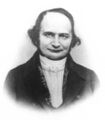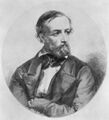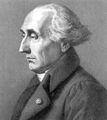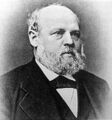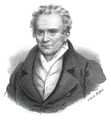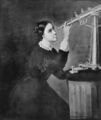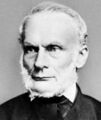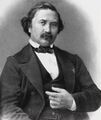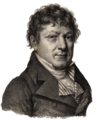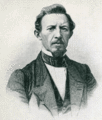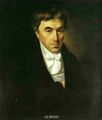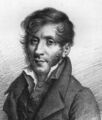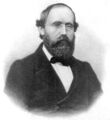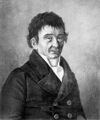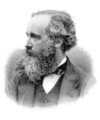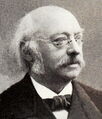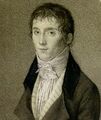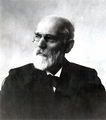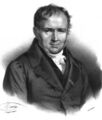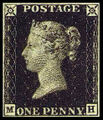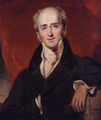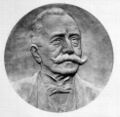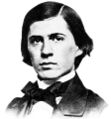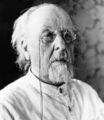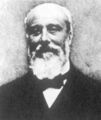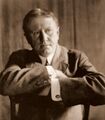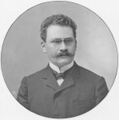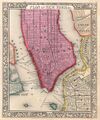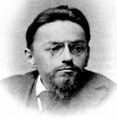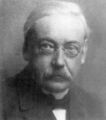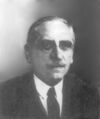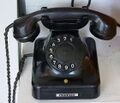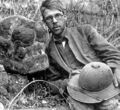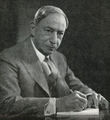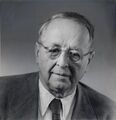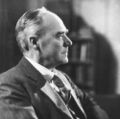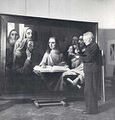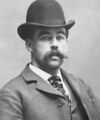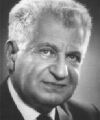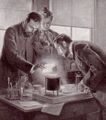Timeline: Middle (nonfiction): Difference between revisions
(Created page with "...") |
No edit summary |
||
| Line 1: | Line 1: | ||
... | ... | ||
1800s | |||
<gallery> | |||
File:Jesse Ramsden. Mezzotint by J. Jones, 1790, after R. Home.jpg|link=Jesse Ramsden (nonfiction)|1800 Nov. 5: Mathematician, astronomical and scientific instrument maker [[Jesse Ramsden (nonfiction)|Jesse Ramsden]] dies. He built his reputation on his dividing engines, which allowed high accuracy measurements of angles and lengths in instruments. He produced instruments for astronomy that were especially well-known for maritime use, where they were needed for the measurement of latitudes and for his surveying instruments which were widely used for cartography and land survey. | |||
File:Joseph Ludwig Raabe.jpg|link=Joseph Ludwig Raabe (nonfiction)|1801 May 15: Mathematician [[Joseph Ludwig Raabe (nonfiction)|Joseph Ludwig Raabe]] born. He will discover Raabe's ratio test, which determines the convergence or divergence of an infinite series, in some cases. | |||
File:George Biddell Airy 1891.jpg|link=George Biddell Airy (nonfiction)|1801 Jul. 27: Mathematician and astronomer [[George Biddell Airy (nonfiction)|George Biddell Airy]] born. His achievements will include work on planetary orbits, measuring the mean density of the Earth, and, in his role as Astronomer Royal, establishing Greenwich as the location of the prime meridian. | |||
File:Antoine Augustin Cournot.jpg|link=Antoine Augustin Cournot (nonfiction)|1801 Aug. 28: Mathematician and philosopher [[Antoine Augustin Cournot (nonfiction)|Antoine Augustin Cournot]] born. He will introduce the ideas of functions and probability into economic analysis. | |||
File:János Bolyai.jpg|link=János Bolyai (nonfiction)|1802 Dec. 15: Mathematician and academic [[János Bolyai (nonfiction)|János Bolyai]] born. He will be one of the founders of non-Euclidean geometry. | |||
File:John Dalton by Charles Turner.jpg|link=John Dalton (nonfiction)|1803 Sep. 3: Chemist [[John Dalton (nonfiction)|John Dalton]] uses symbols to represent the atoms making up molecules of different elements. | |||
File:Joseph Priestley.jpg|link=Joseph Priestley (nonfiction)|1804 Feb. 16: British scientist [[Joseph Priestley (nonfiction)|Joseph Priestley]] dies. He is historically credited with the discovery of oxygen, having isolated it in its gaseous state, but his determination to defend phlogiston theory and to reject what would become the chemical revolution left him isolated within the scientific community. | |||
File:Carl Gustav Jacob Jacobi.jpg|link=Carl Gustav Jacob Jacobi (nonfiction)|1804 Dec. 10: Mathematician and academic [[Carl Gustav Jacob Jacobi (nonfiction)|Carl Gustav Jacob Jacobi]] born. He will make fundamental contributions to elliptic functions, dynamics, differential equations, and number theory. | |||
File:Claude Chappe.jpg|Claude Chappe (nonfiction)|1805 Jan. 23: Inventor [[Claude Chappe (nonfiction)|Claude Chappe]] dies. He invented and developed a practical semaphore system that eventually spanned all of France -- the first practical telecommunications system of the industrial age. | |||
File:Peter Gustav Lejeune Dirichlet.jpg|link=Peter Gustav Lejeune Dirichlet (nonfiction)|1805 Feb. 13: Mathematician [[Peter Gustav Lejeune Dirichlet (nonfiction)|Peter Gustav Lejeune Dirichlet]] born. He will important make contributions to number theory, analysis, and mechanics. Dirichlet will be one of the first mathematicians to give the modern formal definition of a function. | |||
File:A la mémoire de J.M. Jacquard.jpg|link=Joseph Marie Jacquard (nonfiction)|1805 Apr. 12: Emperor Napoleon and Empress Josephine visit Lyon and viewed [[Joseph Marie Jacquard (nonfiction)|Joseph Marie Jacquard]]'s new [[Jacquard loom (nonfiction)|programmable loom]]. | |||
File:A la mémoire de J.M. Jacquard.jpg|link=Joseph Marie Jacquard (nonfiction)|1805 Apr. 15: Emperor grants the patent for Jacquard’s loom to the city of Lyon. In return, Jacquard received a lifelong pension of 3,000 francs. | |||
File:William Rowan Hamilton.png|link=William Rowan Hamilton (nonfiction)|1805 Aug. 4: Physicist, astronomer, and mathematician [[William Rowan Hamilton (nonfiction)|William Rowan Hamilton]] born. He will make important contributions to classical mechanics, optics, and algebra, inventing the [[Quaternion (nonfiction)|quaternion]]. | |||
File:John Stuart Mill circa 1870.jpg|link=John Stuart Mill (nonfiction)|1806 May 20: Economist, civil servant, and philosopher [[John Stuart Mill (nonfiction)|John Stuart Mill]] born. He will be one of the most influential thinkers in the history of liberalism, and the first Member of Parliament to call for women's suffrage. | |||
File:Jérôme Lalande.jpg|link=Jérôme Lalande (nonfiction)|1807 Apr. 4: Astronomer, freemason, and writer [[Jérôme Lalande (nonfiction)|Joseph Jérôme Lefrançois de Lalande]] dies. As a lecturer and writer Lalande helped popularize astronomy. His planetary tables were the best available up to the end of the 18th century. | |||
File:Robert Fulton.jpg|link=Robert Fulton (nonfiction)|1807 Aug. 17: [[Robert Fulton (nonfiction)|Robert Fulton]]'s North River Steamboat leaves New York City for Albany, New York, on the Hudson River, inaugurating the first commercial steamboat service in the world. | |||
File:Pierre Alexandre Laurent Forfait.jpg|link=Pierre-Alexandre-Laurent Forfait (nonfiction)|1807 Nov. 8: Engineer, hydrographer, and politician [[Pierre-Alexandre-Laurent Forfait (nonfiction)|Pierre-Alexandre-Laurent Forfait]] dies. He designed and oversaw the building of ships, making structural improvements and developing techniques to improve the disposition of cargo in ships' holds. | |||
File:Johann Benedict Listing.jpg|link=Johann Benedict Listing (nonfiction)|1808 Jul. 25: Mathematician [[Johann Benedict Listing (nonfiction)|Johann Benedict Listing]] born. He will introduce the term "topology" in a famous article published in 1847, having already used the term in correspondence some years earlier. | |||
File:Benjamin Peirce.jpg|link=Benjamin Peirce (nonfiction)|1809 Apr. 4: Mathematician [[Benjamin Peirce (nonfiction)|Benjamin Peirce]] born. He will make contributions to celestial mechanics, statistics, number theory, algebra, and the philosophy of mathematics; he will become known for the statement that "Mathematics is the science that draws necessary conclusions". | |||
File:Henry Cavendish.jpg|link=Henry Cavendish (nonfiction)|1810 Feb. 24: Chemist, physicist, and philosopher [[Henry Cavendish (nonfiction)|Henry Cavendish]] dies. He discovered "inflammable air", later named hydrogen. | |||
File:Henri Victor Regnault 1860s.jpg|link=Henri Victor Regnault (nonfiction)|1810 Jul. 21: Chemist and physicist [[Henri Victor Regnault (nonfiction)|Henri Victor Regnault]] born. He will be an early thermodynamicist, best known for his careful measurements of the thermal properties of gases, and for mentoring William Thomson in the late 1840s. | |||
File:Urbain Le Verrier.jpg|link=Urbain Le Verrier (nonfiction)|1811 Mar. 11: Mathematician and astronomer [[Urbain Le Verrier (nonfiction)|Urbain Le Verrier]] born. He will predict the existence and position of Neptune using only mathematics, an event which will be widely regarded as one of the most remarkable moments of 19th century science. | |||
File:Robert Bunsen.jpg|link=Robert Bunsen (nonfiction)|1811 Mar. 30: Chemist and academic [[Robert Bunsen (nonfiction)|Robert Bunsen]] born. He will investigate emission spectra of heated elements, and discover caesium (in 1860) and rubidium (in 1861) with the physicist Gustav Kirchhoff. | |||
File:Hasan Tahsini.jpg|link=Hasan Tahsini (nonfiction)|1811 Apr. 7: Astronomer, mathematician, and philosopher [[Hasan Tahsini (nonfiction)|Hasan Tahsini]] born. He will become one of the most prominent scholars of the Ottoman Empire of the 19th century. | |||
Orson_Pratt.jpg|link=Orson Pratt (nonfiction)|1811 Sep. 19: Mathematician and religious leader [[Orson Pratt (nonfiction)|Orson Pratt]] born. As part of his system of Mormon theology, Pratt will embrace the philosophical doctrine of hylozoism. | |||
File:Pieter Rijke.jpg|link=Pieter Rijke (nonfiction)|1812 Jul. 11: Physicist and academic [[Pieter Rijke (nonfiction)|Petrus Leonardus Rijke]] born. He will explore the physics of electricity, and be known for the Rijke tube (which turns heat into sound, by creating a self-amplifying standing wave). | |||
File:Joseph-Louis Lagrange.jpg|link=Joseph-Louis Lagrange (nonfiction)|1813 Apr. 10: Mathematician and astronomer [[Joseph-Louis Lagrange (nonfiction)|Joseph-Louis Lagrange]] dies. He made significant contributions to the fields of analysis, number theory, and both classical and celestial mechanics. | |||
File:Heinrich Geissler.jpg|link=Heinrich Geißler (nonfiction)|1814 May 26: Glassblower, physicist, and inventor [[Heinrich Geißler (nonfiction)|Johann Heinrich Wilhelm Geißler]] born. He will invent the [[Geissler tube (nonfiction)|Geissler tube]], made of glass and used as a low pressure gas-discharge luminescence tube. | |||
File:Samuel Colt.jpg|link=Samuel Colt (nonfiction)|1814 Jul. 19: Engineer and businessman [[Samuel Colt (nonfiction)|Samuel Colt]] born. He will found Colt's Manufacturing Company. | |||
File:James Joseph Sylvester.jpg|link=James Joseph Sylvester (nonfiction)|1814 Sep. 3: Mathematician and academic [[James Joseph Sylvester (nonfiction)|James Joseph Sylvester]] born. He will make fundamental contributions to matrix theory, invariant theory, number theory, partition theory, and combinatorics. | |||
File:Julius Robert Mayer.jpg|link=Julius von Mayer (nonfiction)|1814 Nov. 25: Physician and physicist [[Julius von Mayer (nonfiction)|Julius Robert von Mayer]] born. He will describe the vital chemical process now referred to as oxidation as the primary source of energy for any living creature; but his achievements will be overlooked and priority for the discovery of the mechanical equivalent of heat will be attributed to James Joule. | |||
File:Franz Anton Mesmer.jpg|link=Franz Mesmer (nonfiction)|1815 Mar. 5: Physician [[Franz Mesmer (nonfiction)|Franz Mesmer]] dies. Mesmer theorized that there is a natural energy transference which occurs between all animated and inanimate objects which he called animal magnetism. The effects which he observed are now attributed to hypnosis. | |||
File:Sir Francis Ronalds.jpg|link=Francis Ronalds (nonfiction)|1815 Mar. 9: [[Francis Ronalds (nonfiction)|Francis Ronalds]] describes the first battery-operated clock in the Philosophical Magazine. | |||
File:Karl Weierstrass.jpg|link=Karl Weierstrass (nonfiction)|1815 Oct. 31: Mathematician and academic [[Karl Weierstrass (nonfiction)|Karl Weierstrass]] born. He will be cited as the "father of modern analysis". | |||
File:George Boole.jpg|link=George Boole (nonfiction)|1815 Nov. 2: Mathematician and philosopher [[George Boole (nonfiction)|George Boole]] born. He will work in the fields of differential equations and algebraic logic, developing Boolean algebra and Boolean logic. | |||
File:Ada Lovelace.jpg|link=Ada Lovelace (nonfiction)|1815 Dec. 10: Mathematician and writer [[Ada Lovelace (nonfiction)|Ada Lovelace]] born. She will do pioneering work in symbolic languages for machine processes, developing what will later be called computer programs for Charles Babbage's early mechanical general-purpose computer, the Analytical Engine. | |||
File:Filippo Mazzei.jpg|link=Filippo Mazzei (nonfiction)|1816 Mar. 19: Physician and activist [[Filippo Mazzei (nonfiction)|Filippo Mazzei]] dies. He acted as an agent to purchase arms for Virginia during the American Revolutionary War. | |||
File:Carl Wilhelm Borchardt.jpg|link=Carl Wilhelm Borchardt (nonfiction)|1817 Feb. 22: Mathematician and academic [[Carl Wilhelm Borchardt (nonfiction)|Carl Wilhelm Borchardt]] born. He will contribute to arithmetic-geometric mean theory, continuing work by Gauss and Lagrange. | |||
File:Charles Messier.jpg|link=Charles Messier (nonfiction)|1817 Apr 12: Astronomer [[Charles Messier (nonfiction)|Charles Messier]] dies. He published an astronomical catalogue consisting of nebulae and star clusters that came to be known as the 110 "Messier objects". | |||
File:Edouard-Léon Scott de Martinville.jpg|link=Édouard-Léon Scott de Martinville (nonfiction)|1817 Apr. 25: Printer, bookseller, and inventor [[Édouard-Léon Scott de Martinville (nonfiction)|Édouard-Léon Scott de Martinville]] born. He will invent the phonoautograph, which records an audio signal as a photographic image. | |||
File:Carl Friedrich Gauss 1840 by Jensen.jpg|link=Carl Friedrich Gauss (nonfiction)|1817 Apr. 28: [[Carl Friedrich Gauss (nonfiction)|Carl Friedrich Gauss]] writes to the astronomer H. W. M. Oblers, saying, "I am becoming more and more convinced that the necessity of our (Euclidean) geometry cannot be proved, at least not by human intellect nor for the human intellect." | |||
File:Angelo Secchi.jpg|link=Angelo Secchi (nonfiction)|1818 Jun. 29: Astronomer, academic, and Jesuit [[Angelo Secchi (nonfiction)|Angelo Secchi]] born. Secchi will be a pioneer of astronomical spectroscopy, and one of the first scientists to state authoritatively that the Sun is a star. | |||
File:Gaspard Monge.jpg|link=Gaspard Monge (nonfiction)|1818 Jul. 28: Mathematician and engineer [[Gaspard Monge (nonfiction)|Gaspard Monge]] dies. He invented descriptive geometry, and did pioneering work in differential geometry. | |||
File:Emil du Bois-Reymond.jpg|link=Emil du Bois-Reymond (nonfiction)|1818 Nov. 7: Physician and physiologist [[Emil du Bois-Reymond (nonfiction)|Emil du Bois-Reymond]] born. He will discover nerve action potential, and develop experimental electrophysiology. | |||
File:James Prescott Joule.jpg|link=James Prescott Joule (nonfiction)|1818 Dec. 24: Physicist and brewer [[James Prescott Joule (nonfiction)|James Prescott Joule]] born. He will study the nature of heat, and discover its relationship to mechanical work. | |||
File:Great Comet of 1819 by Kendall.jpg|link=Great Comet of 1819 (nonfiction)|1819 Jul. 1: Johann Georg Tralles discovers the [[Great Comet of 1819 (nonfiction)|Great Comet of 1819]] (C/1819 N1). It was the first comet analyzed using polarimetry, by François Arago. | |||
File:Maria Mitchell.jpg|link=Maria Mitchell (nonfiction)|1819 Aug 1: Astronomer and academic [[Maria Mitchell (nonfiction)|Maria Mitchell]] born. She will be the first American woman to work as a professional astronomer. | |||
File:George Gabriel Stokes.jpg|link=Sir George Stokes, 1st Baronet (nonfiction)|1819 Aug. 13: Physicist and mathematician [[Sir George Stokes, 1st Baronet (nonfiction)|Sir George Stokes, 1st Baronet]] born. He will make pioneering contributions to fluid dynamics (including the Navier–Stokes equations) and to physical optics. | |||
File:James Watt.jpg|link=James Watt (nonfiction)|1819 Aug. 25: inventor, engineer, and chemist [[James Watt (nonfiction)|James Watt]] dies. He made major improvements to the steam engine. | |||
File:George Salmon.jpg|link=George Salmon (nonfiction)|1819 Sep. 25: Mathematician and Anglican theologian [[George Salmon (nonfiction)|George Salmon]] born. He will work in algebraic geometry for two decades, then devote the last forty years of his life to theology. | |||
File:Arthur Cayley.jpg|link=Arthur Cayley (nonfiction)|1821 Aug. 16: Mathematician and academic [[Arthur Cayley (nonfiction)|Arthur Cayley]] born. He will be the first to define the concept of a group in the modern way, as a set with a binary operation satisfying certain laws. | |||
File:Rudolf Clausius.jpg|link=Rudolf Clausius (nonfiction)|1822 Jan. 2: [[Rudolf Clausius (nonfiction)|Rudolf Clausius]] born. He will be one of the central founders of the science of thermodynamics. | |||
File:Francis Galton 1850s.jpg|link=Francis Galton (nonfiction)|1822 Feb. 16: Statistician, progressive, polymath, sociologist, psychologist, anthropologist, eugenicist, tropical explorer, geographer, inventor, meteorologist, proto-geneticist, and psychometrician [[Francis Galton (nonfiction)|Francis Galton]] born. | |||
File:Ignacy Lukasiewicz.jpg|link=Ignacy Łukasiewicz (nonfiction)|1822 Mar. 8: Pharmacist, inventor, and industrialist [[Ignacy Łukasiewicz (nonfiction)|Ignacy Łukasiewicz]] born. He will build the world's first oil refinery and invent the kerosene lamp. | |||
File:Joseph Bertrand.jpg|link=Joseph Bertrand (nonfiction)|1822 Mar. 11: Mathematician, economist, and academic [[Joseph Bertrand (nonfiction)|Joseph Louis François Bertrand]] born. He will work in the fields of number theory, differential geometry, probability theory, economics and thermodynamics. | |||
File:Hannibal Goodwin.jpg|link=Hannibal Goodwin (nonfiction)|1822 Apr. 21: Priest and inventor [[Hannibal Goodwin (nonfiction)|Hannibal Goodwin]] born. He will invent and patent rolled celluloid photographic film. | |||
File:Jean Baptiste Joseph Delambre.png|link=Jean Baptiste Joseph Delambre (nonfiction)|1822 Aug. 19: Mathematician and astronomer [[Jean Baptiste Joseph Delambre (nonfiction)|Jean Baptiste Joseph Delambre]] dies. He was one of the first astronomers to derive astronomical equations from analytical formulas. | |||
File:Wilhelm Bauer.gif|link=Wilhelm Bauer (nonfiction)|1822 Dec. 23: Inventor and engineer [[Wilhelm Bauer (nonfiction)|Wilhelm Bauer]] born. He will design and build several hand-powered [[Submarine (nonfiction)|submarines]]. | |||
File:Gustav Robert Kirchhoff.jpg|link=Gustav Kirchhoff (nonfiction)|1824 Mar. 12: Physicist and academic [[Gustav Kirchhoff (nonfiction)|Gustav Kirchhoff]] born. He will contribute to the fundamental understanding of electrical circuits, spectroscopy, and the emission of black-body radiation by heated objects. | |||
File:Lord Kelvin by Hubert von Herkomer.jpg|link=William Thomson, 1st Baron Kelvin (nonfiction)|1824 Jun. 26: [[William Thomson, 1st Baron Kelvin (nonfiction)|Lord Kelvin]] born. He will do much to unify the emerging discipline of physics in its modern form. | |||
File:Paul Broca.jpg|link=Paul Broca (nonfiction)|1824 Jun. 28: Physician, anatomist, and anthropologist [[Paul Broca (nonfiction)|Paul Broca]] born. He will discover that the brains of patients suffering from aphasia contain lesions in a particular part of the cortex, in the left frontal region -- the first anatomical proof of the localization of brain function. | |||
File:Edward Frankland.jpg|link=Edward Frankland (nonfiction)|1825 Jan. 28: Chemist [[Edward Frankland (nonfiction)|Edward Frankland]] born. He will be one of the originators of organometallic chemistry, introducing the concept of combining power or valence. | |||
File:Johann Friedrich Pfaff.jpg|link=Johann Friedrich Pfaff (nonfiction)|1825 Apr. 21: Mathematician [[Johann Friedrich Pfaff (nonfiction)|Johann Friedrich Pfaff]] dies. He worked on partial differential equations of the first order Pfaffian systems, as they are now called, which became part of the theory of differential forms. | |||
File:Johann Jakob Balmer.jpg|link=Johann Jakob Balmer (nonfiction)|1825 May 1: Mathematician and physicist [[Johann Jakob Balmer (nonfiction)|Johann Jakob Balmer]] born. He will develop an empirical formula for the visible spectral lines of the hydrogen atom. | |||
File:Thomas Henry Huxley.jpg|link=Thomas Henry Huxley (nonfiction)|1825 May 4: Biologist [[Thomas Henry Huxley (nonfiction)|Thomas Henry Huxley]] born. He will be known as "Darwin's Bulldog" for his advocacy of Charles Darwin's theory of evolution. | |||
File:Richard August Carl Emil Erlenmeyer.jpg|link=Emil Erlenmeyer (nonfiction)|1825 Jun. 28: Chemist and academic [[Emil Erlenmeyer (nonfiction)|Emil Erlenmeyer]] born. He will contribute to the early development of the theory of structure, formulating the Erlenmeyer rule, and designing the Erlenmeyer flask. | |||
File:Charles Dupin.jpg|link=Charles Dupin (nonfiction)|1873 Jan. 18: Mathematician, engineer, cartographer, economist, and politician [[Charles Dupin (nonfiction)|Charles Dupin]] dies. In 1826 created the earliest known choropleth map. | |||
File:Tullio Levi-civita.jpg|link=Tullio Levi-Civita (nonfiction)|1873 Mar. 29: Mathematician and academic [[Tullio Levi-Civita (nonfiction)|Tullio Levi-Civita]] born. He will gain fame for his work on absolute differential calculus (tensor calculus) and its applications to the theory of relativity, and make significant contributions in other areas. | |||
File:Georg Friedrich Bernhard Riemann.jpg|link=Bernhard Riemann (nonfiction)|1826 Sep. 17: Mathematician and academic [[Bernhard Riemann (nonfiction)|Bernhard Riemann]] born. He will make contributions to analysis, number theory, and differential geometry. | |||
File:Pierre-Simon, marquis de Laplace by Guérin.jpg|link=Pierre-Simon Laplace (nonfiction)|1827 Mar. 5: Mathematician and astronomer [[Pierre-Simon Laplace (nonfiction)|Pierre-Simon Laplace]] dies. He made important contributions to mathematics, statistics, physics and astronomy. | |||
File:Ernst Chladni.jpg|link=Ernst Chladni (nonfiction)|1827 Apr. 3: Physicist, musician, and academic [[Ernst Chladni (nonfiction)|Ernst Chladni]] dies. He has been called both the father of acoustics and the father of meteoritics. | |||
File:Joseph Lister 1902.jpg|link=Joseph Lister (nonfiction)|1827 Apr. 5: Surgeon and scientist [[Joseph Lister (nonfiction)|Joseph Lister]] born. He will pioneer antiseptic surgery, performing the first antiseptic surgery in 1865. | |||
File:William Blake by John Flaxman c1804.jpg|link=William Blake (nonfiction)|1827 Aug. 12: Poet, painter, and printmaker [[William Blake (nonfiction)|William Blake]] dies. Largely unrecognized during his lifetime, Blake is now considered a seminal figure in the history of the poetry and visual arts of the Romantic Age. Although Blake was considered mad by contemporaries for his idiosyncratic views, he is held in high regard by later critics for his expressiveness and creativity, and for the philosophical and mystical undercurrents within his work. | |||
File:Karl Mikhailovich Peterson.jpg|link=Karl Mikhailovich Peterson (nonfiction)|1828 May 25: Mathematician [[Karl Mikhailovich Peterson (nonfiction)|Karl Mikhailovich Peterson]] born. He will discover equations which will subsequently be named the Gauss–Codazzi equations, fundamental to the theory of embedded hypersurfaces in a Euclidean space. | |||
File:William Stanley.jpg|link=William Stanley (nonfiction)|1829 Feb. 2: Inventor, engineer, and philanthropist [[William Stanley (nonfiction)|William Stanley]] born. He will design and manufacture precision drawing and mathematical instruments, as well as surveying instruments and telescopes. | |||
File:Typographer patent 1829.jpg|link=Typographer (typewriter) (nonfiction)|1829 Jul. 23: William Austin Burt patents the [[Typographer (typewriter) (nonfiction)|typographer]], a precursor to the typewriter. | |||
File:Moritz Benedikt Cantor.jpg|link=Moritz Cantor (nonfiction)|1829 Aug. 23: Mathematician and historian [[Moritz Cantor (nonfiction)|Moritz Cantor]] born. He will write ''Vorlesungen über Geschichte der Mathematik'', which traces the history of mathematics up to 1799. | |||
File:Joseph_Fourier.jpg|link=Joseph Fourier (nonfiction)|1830 May 16: Mathematician and physicist [[Joseph Fourier (nonfiction)|Joseph Fourier]] dies. He initiated the investigation of Fourier series and their applications to problems of heat transfer and vibrations. | |||
File:Samuel Bentham.jpg|link=Samuel Bentham (nonfiction)|1831 May 31: engineer and naval architect [[Samuel Bentham (nonfiction)|Samuel Bentham]] dies. He designed the first Panopticon. | |||
File:James Clerk Maxwell.png|link=James Clerk Maxwell (nonfiction)|1831 Jun. 13: Physicist and mathematician [[James Clerk Maxwell (nonfiction)|James Clerk Maxwell]] born. His discoveries will help usher in the era of modern physics, laying the foundation for such fields as special relativity and quantum mechanics. | |||
File:Sophie Germain.jpg|link=Sophie Germain (nonfiction)|1831 Jun. 27: Mathematician, physicist, and philosopher [[Sophie Germain (nonfiction)|Sophie Germain]] dies. Her work on Fermat's Last Theorem provided a foundation for mathematicians exploring the subject for hundreds of years after. | |||
File:Carl Gustav Jacob Jacobi.jpg|link=Carl Gustav Jacob Jacobi (nonfiction)|1831 Sep. 11: Mathematician [[Carl Gustav Jacob Jacobi (nonfiction)|Carl Jacobi]] is appointed, after a four hour disputation in Latin, professor at the University of Konigsberg. While there he will inaugurate what is then a complete novelty in mathematics: research seminars for the more advanced students and interested colleagues. | |||
File:Richard Dedekind.jpg|link=Richard Dedekind (nonfiction)|1831 Oct. 6: Mathematician, philosopher, and academic [[Richard Dedekind (nonfiction)|Richard Dedekind]] born. He will make important contributions to abstract algebra (particularly ring theory), algebraic number theory and the definition of the real numbers. | |||
File:Jean-Louis_Pons.jpg|link=Jean-Louis Pons (nonfiction)|1831 Oct. 14: Astronomer [[Jean-Louis Pons (nonfiction)|Jean-Louis Pons]] dies. He was the greatest visual comet discoverer of all time: between 1801 and 1827, Pons discovered thirty-seven comets, more than any other person in history. | |||
File:Johannes Bosscha.jpg|link=Johannes Bosscha (nonfiction)|1831 Nov. 18: Physicist [[Johannes Bosscha (nonfiction)|Johannes Bosscha Jr.]] born. He will make important investigations on galvanic polarization and the rapidity of sound waves; he will be one of the first (1855) to suggest the possibility of sending two messages simultaneously over the same wire. | |||
File:Paul Du Bois-Reymond Heidelberg.jpg|link=Paul du Bois-Reymond (nonfiction)|1831 Dec. 2: Mathematician [[Paul du Bois-Reymond (nonfiction)|Paul David Gustav du Bois-Reymond]] born. He will work on the theory of functions and in mathematical physics. | |||
File:Thomas Seebeck.jpg|link=Thomas Johann Seebeck (nonfiction)|1831 Dec. 10: Physicist and academic [[Thomas Johann Seebeck (nonfiction)|Thomas Johann Seebeck]] dies. He discovered the thermoelectric effect. | |||
File:Lewis Carroll.jpg|link=Lewis Carroll (nonfiction)|1832 Jan. 27: Novelist, poet, and mathematician [[Lewis Carroll (nonfiction)|Lewis Carroll]] born. He will write ''Alice's Adventures in Wonderland'', and its sequel ''Through the Looking-Glass''. | |||
File:Carl Gottfried Neumann.jpg|link=Carl Gottfried Neumann (nonfiction)|1832 May 7: Mathematician [[Carl Gottfried Neumann (nonfiction)|Carl Gottfried Neumann]] born. He will study physics with his father, and later work as a mathematician, dealing almost exclusively with problems arising from physics. | |||
File:Jean-Antoine Chaptal.jpg|link=Jean-Antoine-Claude Chaptal (nonfiction)|1832 Jul. 30: Chemist, physician, agronomist, industrialist, statesman, educator, and philanthropist [[Jean-Antoine-Claude Chaptal (nonfiction)|Jean-Antoine-Claude Chaptal]] dies. | |||
File:Alfred Clebsch.jpg|link=Alfred Clebsch (nonfiction)|1833 Jan. 19: Mathematician and academic [[Alfred Clebsch (nonfiction)|Alfred Clebsch]] born. He will make important contributions to algebraic geometry and invariant theory. | |||
File:Joseph_Nicéphore_Niépce.jpg|link=Nicéphore Niépce (nonfiction)|1833 Jul. 5: Inventor [[Nicéphore Niépce (nonfiction)|Nicéphore Niépce]] dies. He invented heliography, a technique which he used to create the world's oldest surviving product of a photographic process. | |||
File:Johann Philipp Reis.jpg|link=Johann Philipp Reis (nonfiction)|1834 Jan. 7: Scientist and inventor [[Johann Philipp Reis (nonfiction)|Johann Philipp Reis]] born. He will invent the Reis Telephone. | |||
File:John Venn.jpg|link=John Venn (nonfiction)|1834 Aug. 1: Mathematician and philosopher [[John Venn (nonfiction)|John Venn]] born. He will invent the Venn diagram, now widely used set theory, probability, logic, statistics, and computer science. | |||
File:Georg Hermann Quincke.jpg|link=Georg Hermann Quincke (nonfiction)|1834 Nov. 19: Physicist and academic [[Georg Hermann Quincke (nonfiction)|Georg Hermann Quincke]] born. He will conduct prolonged researches on the subject of the influence of electric forces upon the constants of different forms of matter, modifying the dissociation hypothesis of Clausius. | |||
File:Elisha Gray.jpg|link=|1835 Aug. 2: Electrical engineer [[Elisha Gray (nonfiction)|Elisha Gray]] born. He will do pioneering work in electrical information technologies, including the [[Telephone (nonfiction)|telephone]]. | |||
File:Samuel Colt.jpg|link=Samuel Colt (nonfiction)|1836 Mar. 5: Inventor [[Samuel Colt (nonfiction)|Samuel Colt]] patents the first production-model revolver, the .34-caliber. | |||
File:Francis Baily.jpg|link=Francis Baily (nonfiction)|1836 May 15: Astronomer [[Francis Baily (nonfiction)|Francis Baily]] observes "Baily's beads" during an annular eclipse. | |||
File:André-Marie_Ampère.jpg|link=André-Marie Ampère (nonfiction)|1836 Jun. 10: Physicist and mathematician [[André-Marie Ampère (nonfiction)|André-Marie Ampère]] dies. He was one of the founders of the science of classical electromagnetism, which he referred to as "electrodynamics". | |||
File:Blodget's Hotel.jpg|link=1836 Patent Office fire (nonfiction)|1836 Dec. 15: A [[1836 Patent Office fire (nonfiction)|fire at the U.S. Patent Office]] destroys all 10,000 patents and several thousand related patent models. | |||
File:Telegraph.jpg|link=Electrical telegraph (nonfiction)|1837 Jul. 12: The first commercial use of an [[Electrical telegraph (nonfiction)|electrical telegraph]] is successfully demonstrated in London by William Cooke and Charles Wheatstone. | |||
File:Johannes Diderik van der Waals.jpg|link=Johannes Diderik van der Waals (nonfiction)|1837 Nov. 23: Theoretical physicist and academic [[Johannes Diderik van der Waals (nonfiction)|Johannes Diderik van der Waals]] born. He will win the 1910 Nobel Prize in physics for his work on the equation of state for gases and liquids. | |||
File:Nathaniel Bowditch.jpg|link=Nathaniel Bowditch (nonfiction)|1838 Mar. 16: American captain and mathematician [[Nathaniel Bowditch (nonfiction)|Nathaniel Bowditch]] dies. He was a founder of modern maritime navigation; his book ''The New American Practical Navigator'', first published in 1802, is still carried on board every commissioned U.S. Naval vessel. | |||
File:Opium War.jpg|link=First Opium War (nonfiction)|1839 Jun. 3: In Humen, China, Lin Tse-hsü destroys 1.2 million kg of opium confiscated from British merchants, preliminary to the [[First Opium War (nonfiction)|First Opium War]]. | |||
File:Julius Petersen.jpg|link=Julius Petersen (nonfiction)|1839 Jun. 16: Mathematician [[Julius Petersen (nonfiction)|Julius Petersen]] born. His famous paper ''Die Theorie der regulären graphs'' will be a fundamental contribution to modern graph theory. | |||
File:Simeon Poisson.jpg|link=Siméon Denis Poisson (nonfiction)|1840 Apr. 25: Mathematician and physicist [[Siméon Denis Poisson (nonfiction)|Siméon Denis Poisson]] dies. His memoirs on the theory of electricity and magnetism constitute a new branch of mathematical physics. | |||
File:Penny Black.jpg|link=Penny Black (nonfiction)|1840 May 1: The [[Penny Black (nonfiction)|Penny Black postage stamp]] becomes valid for use in the United Kingdom of Great Britain and Ireland. | |||
File:Telegraph.jpg|link=Electrical telegraph (nonfiction)|1840 Jun. 20: [[Samuel Morse (nonfiction)|Samuel Morse]] receives the patent for the [[Electrical telegraph (nonfiction)|telegraph]]. | |||
File:Jørgen Jørgensen (Eckersberg).jpg|link=Jørgen Jørgensen (nonfiction)|1841 Jan. 20: Adventurer [[Jørgen Jørgensen (nonfiction)|Jørgen Jørgensen]] dies. He sailed to Iceland, declaring the country independent from Denmark and pronouncing himself its ruler, intending to found a new republic following the United States of America and France. | |||
File:Ernst Schroeder.jpg|link=Ernst Schröder (nonfiction)|1841 Nov. 25: Mathematician and logician [[Ernst Schröder (nonfiction)|Ernst Schröder]] born. His monumental ''Vorlesungen über die Algebra der Logik'' will prepare the way for the emergence of mathematical logic as a separate discipline in the twentieth century by systematizing the various systems of formal logic of the day. | |||
File:Édouard Lucas.png|link=Édouard Lucas (nonfiction)|1842 Apr. 4: Mathematician [[Édouard Lucas (nonfiction)|Édouard Lucas]] born. He will study the Fibonacci sequence; the related Lucas sequences and Lucas numbers will be named after him. | |||
File:Dominique Jean Larrey.jpg|link=Dominique Jean Larrey (nonfiction)|1842 Jul. 25: Physician and surgeon [[Dominique Jean Larrey (nonfiction)|Dominique Jean Larrey]] dies. He was an important innovator in battlefield medicine and triage, and is often considered the first modern military surgeon. | |||
File:Marius Sophus Lie.jpg|link=Marius Sophus Lie (nonfiction)|1842 Dec. 17: Mathematician and academic [[Marius Sophus Lie (nonfiction)|Marius Sophus Lie]] born. He will largely create the theory of continuous symmetry and apply it to the study of geometry and differential equations. | |||
File:Joseph Nicollet.jpg|link=Joseph Nicollet (nonfiction)|1843 Sep. 11: Mathematician and explorer [[Joseph Nicollet (nonfiction)|Joseph Nicollet]] dies. He mapped the Upper Mississippi River basin during the 1830s. | |||
File:William Rowan Hamilton.png|link=William Rowan Hamilton (nonfiction)|1843 Oct. 16: Sir [[William Rowan Hamilton (nonfiction)|William Rowan Hamilton]] comes up with the idea of [[Quaternion (nonfiction)|quaternions]], a non-commutative extension of complex numbers. | |||
File:Telegraph.jpg|link=Electrical telegraph (nonfiction) |1844 May 24: [[Samuel Morse (nonfiction)|Samuel Morse]] sends the message "What hath God wrought" (a biblical quotation, Numbers 23:23) from the Old Supreme Court Chamber in the United States Capitol to his assistant, Alfred Vail, in Baltimore, Maryland, to inaugurate a commercial [[Electrical telegraph (nonfiction) |telegraph line]] between Baltimore and Washington D.C. | |||
File:John Dalton by Charles Turner.jpg|link=John Dalton (nonfiction)|1844 Jul. 27: Chemist, meteorologist, and physicist [[John Dalton (nonfiction)|John Dalton]] dies. He proposed the modern atomic theory, and did research in color blindness. | |||
File:Francis Baily.jpg|link=Francis Baily (nonfiction)|1844 Aug. 30: Astronomer [[Francis Baily (nonfiction)|Francis Baily]] dies. He observed "Baily's beads" during an annular eclipse (1836). | |||
File:Max_Noether_(between_1870_and_1875).jpg|link=Max Noether (nonfiction)|1844 Sep. 24: Mathematician [[Max Noether (nonfiction)|Max Noether]] born. Noether will contribute to algebraic geometry and the theory of algebraic functions. He will be the father of mathematician Emmy Noether. | |||
File:Charles-Émile Reynaud.jpg|link=Charles-Émile Reynaud (nonfiction)|1844 Dec. 8: Scientist, inventor, and educator [[Charles-Émile Reynaud (nonfiction)|Charles-Émile Reynaud]] born. He will invent the Praxinoscope (an improved zoetrope) and be responsible for the first projected animated films. | |||
File:Georg Cantor 1894.png|link=Georg Cantor (nonfiction)|1845 Mar. 3: Mathematician and philosopher [[Georg Cantor (nonfiction)|Georg Cantor]] born. He will invent [[Set theory (nonfiction)|set theory]], a fundamental area of mathematical inquiry. | |||
File:Charles Grey, 2nd Earl Grey by Sir Thomas Lawrence copy.jpg|link=Charles Grey, 2nd Earl Grey (nonfiction)|1845 Jul. 17: [[Charles Grey, 2nd Earl Grey (nonfiction)|Charles Grey, 2nd Earl Grey]] dies. His government will see the abolition of slavery in the British Empire. | |||
File:Samuel Colt.jpg|link=Samuel Colt (nonfiction)|1847 Jan. 4: [[Samuel Colt (nonfiction)|Samuel Colt]] sells his first revolver pistol to the United States government. | |||
File:Thomas Edison.jpg|link=Thomas Edison (nonfiction)|1847 Feb. 11: Inventor, engineer, and businessman [[Thomas Edison (nonfiction)|Thomas Edison]] born. He will develope the light bulb and the phonograph, among other inventions. | |||
File:Alexander Graham Bell.jpg|link=Alexander Graham Bell (nonfiction)|1847 Mar. 3: Engineer, inventor, and academic [[Alexander Graham Bell (nonfiction)|Alexander Graham Bell]] born. He will patent the telephone in 1876. | |||
File:Cesare_Arzelà.jpg|link=Cesare Arzelà (nonfiction)|1847 Mar. 6: Mathematician [[Cesare Arzelà (nonfiction)|Cesare Arzelà]] born. He will contribute to the theory of functions, notably his characterization of sequences of continuous functions. | |||
File:Caroline_Herschel_1829.jpg|link=Caroline Herschel (nonfiction)|1848 Jan. 9: Astronomer [[Caroline Herschel (nonfiction)|Caroline Herschel]] dies. She discovered several comets, including the periodic comet 35P/Herschel-Rigollet, which bears her name. | |||
File:Vilfredo Pareto 1870s.jpg|link=Vilfredo Pareto (nonfiction)|1848 Jul. 14: Engineer, sociologist, economist, political scientist, and philosopher [[Vilfredo Pareto (nonfiction)|Vilfredo Pareto]] born. He will apply mathematics to economic analysis, asserting that the distribution of incomes and wealth in society is not random and that a consistent pattern appears throughout history, in all parts of the world and in all societies. | |||
File:Gottlob Frege.jpg|link=Gottlob Frege (nonfiction)|1848 Nov. 8: Mathematician, logician, and philosopher [[Gottlob Frege (nonfiction)|Gottlob Frege]] born. Though will be largely ignored during his lifetime, his work will influence later generations of logicians and philosophers. | |||
File:Charles Sanders Peirce in 1859.jpg|link=Charles Sanders Peirce (nonfiction)|1849 Sep. 10: Mathematician and philosopher [[Charles Sanders Peirce (nonfiction)|Charles Sanders Peirce]] born. He wil be remembered as "the father of pragmatism". | |||
File:Georg Frobenius.jpg|link=Ferdinand Georg Frobenius (nonfiction)|1849 Oct. 26: Mathematician and academic [[Ferdinand Georg Frobenius (nonfiction)|Ferdinand Georg Frobenius]] born. He will make contributions to the theory of elliptic functions, differential equations, and group theory. | |||
File:Ruy Barbosa 1907.jpg|link=Rui Barbosa (nonfiction)|1849 Nov. 5: Polymath, diplomat, jurist, and politician [[Rui Barbosa (nonfiction)|Rui Barbosa]] born. He will authorize the destruction of most government records relating to slavery, "erasing the stain" of slavery on Brazilian history, yet preventing any possible indemnization of the former slave-owners. | |||
File:John Ambrose Fleming 1890.png|link=John Ambrose Fleming (nonfiction)|1849 Nov. 29: Electrical engineer and physicist [[John Ambrose Fleming (nonfiction)|John Ambrose Fleming]] born. He will invent the thermionic valve, also known as the vacuum tube. | |||
</gallery> | |||
<gallery> | |||
File:Sofya_Kovalevskaya.jpg|link=Sofia Kovalevskaya (nonfiction)|1850 Jan. 15: Mathematician and physicist [[Sofia Kovalevskaya (nonfiction)|Sofia Kovalevskaya]] born. Kovalevskaya will contribute to analysis, partial differential equations, and mechanics. | |||
File:George Gabriel Stokes.jpg|link=Sir George Stokes, 1st Baronet (nonfiction)|1850 Jul. 2: Stokes' theorem appeared for the first time as a postscript to a letter from Sir William Thomson (Lord Kelvin) to Stokes. By the time Stokes died, the theorem was universally known as "Stokes' theorem." | |||
File:Jacobus Kapteyn.jpg|link=Jacobus Kapteyn (nonfiction)|1851 Jan. 19: Astronomer and academic [[Jacobus Kapteyn (nonfiction)|Jacobus Kapteyn]] born. Kapteyn will conduct extensive studies of the Milky Way using photography and statistical methods to determine the motions and distribution of stars, discovering evidence for galactic rotation. | |||
File:Carl Gustav Jacob Jacobi.jpg|link=Carl Gustav Jacob Jacobi (nonfiction)|1851 Feb. 18: Mathematician and academic [[Carl Gustav Jacob Jacobi (nonfiction)|Carl Gustav Jacob Jacobi]] dies. He made fundamental contributions to elliptic functions, dynamics, differential equations, and number theory. | |||
File:Hans Christian Ørsted.jpg|link=Hans Christian Ørsted (nonfiction)|1851 Mar. 9: Physicist and chemist [[Hans Christian Ørsted (nonfiction)|Hans Christian Ørsted]] dies. He discovered that electric currents create magnetic fields, which was the first connection found between electricity and magnetism. | |||
File:George Chrystal.jpg|link=George Chrystal (nonfiction)|1851 Mar. 26: Mathematician [[George Chrystal (nonfiction)|George Chrystal]] born. He will be awarded a Gold Medal from the Royal Society of London (confirmed shortly after his death) for his studies of [[Seiche (nonfiction)|seiches]] (wave patterns in large inland bodies of water). | |||
File:Carl Louis Ferdinand von Lindemann.jpg|link=Ferdinand von Lindemann (nonfiction)|1852 Apr. 12: Mathematician and academic [[Ferdinand von Lindemann (nonfiction)|Ferdinand von Lindemann]] born. He will prove (1882) that π (pi) is a transcendental number. | |||
File:Ada Lovelace.jpg|link=Ada Lovelace (nonfiction)|1852 Nov. 27: Mathematician and writer [[Ada Lovelace (nonfiction)|Ada Lovelace]] dies. She did pioneering work in symbolic languages for machine processes, developing what will later be called computer programs for Charles Babbage's early mechanical general-purpose computer, the Analytical Engine. | |||
File:Hendrik_Antoon_Lorentz.jpg|link=Hendrik Lorentz (nonfiction)|1853 Jul. 18: Physicist and academic [[Hendrik Lorentz (nonfiction)|Hendrik Lorentz]] born. He will share the 1902 Nobel Prize in Physics with Pieter Zeeman for the discovery and theoretical explanation of the Zeeman effect. | |||
File:Heike Kamerlingh Onnes.jpg|link=Heike Kamerlingh Onnes (nonfiction)|1853 Sept 21: Physicist and academic [[Heike Kamerlingh Onnes (nonfiction)|Heike Kamerlingh Onnes]] born. He will receive widespread recognition for his work, including the 1913 Nobel Prize in Physics for "his investigations on the properties of matter at low temperatures which led, ''inter alia'', to the production of liquid helium". | |||
File:François Arago.jpg|link=François Arago (nonfiction)|1853 Oct. 2: Mathematician and politician [[François Arago (nonfiction)|François Arago]] born. He observed that a rotating plate of copper tends to communicate its motion to a magnetic needle suspended over it, an effect now known as eddy current. | |||
File:Henri Poincaré.jpg|link=Henri Poincaré (nonfiction)|1854 Apr. 29: Mathematician, physicist, and engineer [[Henri Poincaré (nonfiction)|Henri Poincaré]] born. He will make many original fundamental contributions to pure and applied mathematics, mathematical physics, and celestial mechanics. | |||
File:George_Eastman.jpg|link=George Eastman (nonfiction)|1854 Jul. 12: [[George Eastman (nonfiction)|George Eastman]] born. He will found the Eastman Kodak Company and popularize the use of roll film, helping to bring photography to the mainstream. | |||
File:Charles Algernon Parsons.jpg|link=Charles Algernon Parsons (nonfiction)|1854 Jun. 13: Engineer and inventor [[Charles Algernon Parsons (nonfiction)|Charles Algernon Parsons]] born. He will invent the compound steam turbine, and work on dynamo and turbine design, power generation, and optical equipment for searchlights and telescopes. | |||
File:Sekiya Seikei.jpg|link=Sekiya Seikei (nonfiction)|1855 Jan. 28: Geologist [[Sekiya Seikei (nonfiction)|Sekiya Seikei]] born. He will be one of the first seismologists, influential in establishing the study of seismology in Japan and known for his model showing the motion of an earth-particle during an earthquake. | |||
File:Carl Friedrich Gauss 1840 by Jensen.jpg|link=Carl Friedrich Gauss (nonfiction)|1855 Feb 23: Mathematician, astronomer, and physicist [[Carl Friedrich Gauss (nonfiction)|Carl Friedrich Gauss]] dies. He had an exceptional influence in many fields of mathematics and science and is ranked as one of history's most influential mathematicians. | |||
File:Nikolai Tesla 1896.jpg|link=Nikola Tesla (nonfiction)|1856 Jul. 10: Electrical engineer [[Nikola Tesla (nonfiction)|Nikola Tesla]] born. He will make pioneering contributions to the design of the modern alternating current (AC) electricity supply system. | |||
File:J_J_Thomson.jpg|link=J. J. Thomson (nonfiction)|1856 Dec. 15: Physicist and academic [[J. J. Thomson (nonfiction)|J. J. Thomson]] born. His research in cathode rays will lead to the discovery of the electron. Thomson will also discover the first evidence for isotopes of a stable element. | |||
File:Edouard-Léon Scott de Martinville.jpg|link=Édouard-Léon Scott de Martinville (nonfiction)|1857 Jan. 25: Printer, bookseller, and inventor [[Édouard-Léon Scott de Martinville (nonfiction)|Édouard-Léon Scott de Martinville]] submits sealed patent application for the phonoautograph, which records an audio signal as a photographic image. | |||
File:Edouard-Léon Scott de Martinville.jpg|link=Édouard-Léon Scott de Martinville (nonfiction)|1857 Mar. 25: Printer, bookseller, and inventor [[Édouard-Léon Scott de Martinville (nonfiction)|Édouard-Léon Scott de Martinville]] is receives a patent for the phonoautograph, which records an audio signal as a photographic image. | |||
File:Konstantin Tsiolkovsky.jpg|link=Konstantin Tsiolkovsky (nonfiction)|1857 Sep. 17: Scientist and engineer [[Konstantin Tsiolkovsky (nonfiction)|Konstantin Tsiolkovsky]] born. He will be one of the founding fathers of modern rocketry and astronautics. | |||
File:Aleksandr Ljapunov.jpg|link=Aleksandr Lyapunov (nonfiction)|1857 Jun. 6: Mathematician and physicist [[Aleksandr Lyapunov (nonfiction)|Aleksandr Lyapunov]] born. Lyapunov will contribute to several fields, including differential equations, potential theory, dynamical systems and probability theory. His main preoccupations will be the stability of equilibria and the motion of mechanical systems, and the study of particles under the influence of gravity. | |||
File:George Cayley.jpg|link=George Cayley (nonfiction)|1857 Dec. 15: Engineer [[George Cayley (nonfiction)|George Cayley]] dies. He did pioneering work in aeronautics, investigating and codifying the dynamics of flight. | |||
File:Max Planck 1878.gif|link=Max Planck (nonfiction)|1858 Apr. 23: Physicist and academic [[Max Planck (nonfiction)|Max Planck]] born. He will make many contributions to theoretical physics, earning fame as the originator of quantum theory. | |||
File:Joseph Ludwig Raabe.jpg|link=Joseph Ludwig Raabe (nonfiction)|1859 Jan. 22: Mathematician [[Joseph Ludwig Raabe (nonfiction)|Joseph Ludwig Raabe]] dies. He is best known for Raabe's ratio test, which determines the convergence or divergence of an infinite series, in some cases. | |||
File:Alexander Stepanovich Popov.jpg|link=Alexander Stepanovich Popov (nonfiction)|1859 Mar. 16: Physicist and academic [[Alexander Stepanovich Popov (nonfiction)|Alexander Stepanovich Popov]] born. He will do pioneering research in high frequency electrical phenomena; in Russia and some eastern European, he will be acclaimed as the inventor of radio. | |||
File:Edmund Husserl 1910s.jpg|link=Edmund Husserl (nonfiction)|1859 Apr. 8: Mathematician and philosopher [[Edmund Husserl (nonfiction)|Edmund Husserl]] born. He will argue that transcendental consciousness sets the limits of all possible knowledge. | |||
File:Joseph_Diez_Gergonne.jpg|link=Joseph Diez Gergonne (nonfiction)|1859 May 5: Mathematician and logician [[Joseph Diez Gergonne (nonfiction)|Joseph Diez Gergonne]] dies. He contributed to the principle of duality in projective geometry, by noticing that every theorem in the plane connecting points and lines corresponds to another theorem in which points and lines are interchanged, provided that the theorem embodied no metrical notions. | |||
File:Peter Gustav Lejeune Dirichlet.jpg|link=Peter Gustav Lejeune Dirichlet (nonfiction)|1859 May 5: Mathematician [[Peter Gustav Lejeune Dirichlet (nonfiction)|Peter Gustav Lejeune Dirichlet]] dies. He made important contributions to number theory, analysis, and mechanics. Dirichlet was one of the first mathematicians to give the modern formal definition of a function. | |||
File:Origin of Species title page.jpg|link=On the Origin of Species (nonfiction)|1859 Nov. 24: Charles Darwin publishes ''[[On the Origin of Species (nonfiction)|On the Origin of Species]]''. | |||
File:Louis_Poinsot.jpg|link=Louis Poinsot (nonfiction)|1859 Dec. 5: Mathematician and physicist [[Louis Poinsot (nonfiction)|Louis Poinsot]] dies. Poinsot invented geometrical mechanics, showing how a system of forces acting on a rigid body can be resolved into a single force and a couple. | |||
File:János Bolyai.jpg|link=János Bolyai (nonfiction)|1860 Jan. 27: Mathematician and academic [[János Bolyai (nonfiction)|János Bolyai]] dies. He was one of the founders of non-Euclidean geometry. | |||
File:James Braid.jpg|link=James Braid (nonfiction)|1860 Mar. 25: Surgeon and gentleman scientist [[James Braid (nonfiction)|James Braid]] dies. He was an important and influential pioneer of hypnotism and hypnotherapy. | |||
File:Edouard-Léon Scott de Martinville.jpg|link=Édouard-Léon Scott de Martinville (nonfiction)|1860 Apr. 9: On his phonautograph machine, [[Édouard-Léon Scott de Martinville (nonfiction)|Édouard-Léon Scott de Martinville]] makes the oldest known recording of an audible human voice. A visual recording of audio data, it will first be played back in 2008. | |||
File:Vito Volterra.jpg|link=Vito Volterra (nonfiction)|1860 May 3: Mathematician and physicist [[Vito Volterra (nonfiction)|Vito Volterra]] born. He will be one of the founders of functional analysis, making contributions to mathematical biology and integral equations. | |||
File:Oliver Blackburn Shallenberger.jpg|link=Oliver B. Shallenberger (nonfiction)|1860 May 7: Electrical engineer and inventor [[Oliver B. Shallenberger (nonfiction)|Oliver Blackburn Shallenberger]] born. He will invent the first successful alternating current electrical meter, which will be critical to the general acceptance of AC power. | |||
File:Telegraph.jpg|link=Electrical telegraph (nonfiction)|1860 Oct. 8: [[Electrical telegraph (nonfiction)|Telegraph]] line between Los Angeles and San Francisco opens. | |||
File:Margaret Eliza Maltby circa 1908.jpg|link=Margaret Eliza Maltby (nonfiction)|1860 Dec. 10: Physicist [[Margaret Eliza Maltby (nonfiction)|Margaret Eliza Maltby]] born. She will contribute to the measurement of high electrolytic resistances and conductivity of very dilute solutions. | |||
File:Pierre Duhem.jpg|link=Pierre Duhem (nonfiction)|1861 Jun. 9: Physicist, mathematician, and historian [[Pierre Duhem (nonfiction)|Pierre Duhem]] born. He will write: "A theory of physics is not an explanation. It is a system of mathematical propositions, deduced from a small number of principles, which have for their aim to represent as simply, as completely and as exactly as possible, a group of experimental laws." | |||
File:Dmitry_Mirimanoff.jpg|link=Dmitry Mirimanoff (nonfiction)|1861 Sep. 13: Mathematician [[Dmitry Mirimanoff (nonfiction)|Dmitry Mirimanoff]] born. In 1917, he will introduce (though not as explicitly as John von Neumann later) the cumulative hierarchy of sets and the notion of von Neumann ordinals; although he will introduce a notion of regular (and well-founded set) he will not consider regularity as an axiom, but also explore what is now called non-well-founded set theory, and have an emergent idea of what is now called bisimulation. | |||
File:Samuel Colt.jpg|link=Samuel Colt (nonfiction)|1862 Jan. 10: Engineer and businessman [[Samuel Colt (nonfiction)|Samuel Colt]] dies. He founded Colt's Manufacturing Company. | |||
File:Maurice d'Ocagne.jpg|link=Philbert Maurice d’Ocagne (nonfiction)|1862 Mar. 25: Mathematician and engineer [[Philbert Maurice d’Ocagne (nonfiction)|Philbert Maurice d’Ocagne]] born. He will found the field of nomography, the graphic computation of algebraic equations, on charts which he will called [[Nomogram (nonfiction)|nomograms]]. | |||
File:William Sydney Porter.jpg|link=O. Henry (nonfiction)|1862 Sep. 11: Short story writer [[O. Henry (nonfiction)|O. Henry]], known for his surprise endings, born. | |||
File:John Charles Fields.jpg|link=John Charles Fields (nonfiction)|1863 May 14: Mathematician [[John Charles Fields (nonfiction)|John Charles Fields]] born. He will found the Fields Medal for outstanding achievement in mathematics. | |||
File:Confederate submarine H. L. Hunley.jpg|link=H. L. Hunley (nonfiction)|1863 Aug. 12: Confederate submarine ''[[H. L. Hunley (nonfiction)|H. L. Hunley]]'' arrives at Charleston, South Carolina by rail. A pioneering vessel, ''Hunley'' will later played a small part in the American Civil War, revealing the advantages and the dangers of undersea warfare. | |||
File:Alexey Krylov 1910s.jpg|link=Aleksey Krylov (nonfiction)|1863 Aug. 15: Mathematician and naval engineer [[Aleksey Krylov (nonfiction)|Aleksey Krylov]] born. Fame will come to him in the 1890s, when his pioneering theory of oscillating motions of the ship becomes internationally known. | |||
File:Confederate submarine H. L. Hunley.jpg|link=H. L. Hunley (nonfiction)|1863 Aug. 29: Confederate submarine ''[[H. L. Hunley (nonfiction)|H. L. Hunley]]'' sinks during a test run, killing five members of her crew. | |||
File:Confederate submarine H. L. Hunley.jpg|link=H. L. Hunley (nonfiction)|1863 Oct. 15: Confederate submarine ''[[H. L. Hunley (nonfiction)|H. L. Hunley]]'' sinks for the second time, killing all eight of her second crew, including Horace Hunley himself, who was aboard at the time, even though he was not a member of the Confederate military. | |||
File:Confederate submarine H. L. Hunley.jpg|link=H. L. Hunley (nonfiction)|1864 Feb. 17: Confederate submarine ''[[H. L. Hunley (nonfiction)|H. L. Hunley]]'' engages and sinks the Union warship USS ''Housatonic''. This is the first known instance of a submarine engaging and sinking a warship. | |||
File:Hermann Minkowski.jpg|link=Hermann Minkowski (nonfiction)|1864 Jun. 22: Mathematician and academic [[Hermann Minkowski (nonfiction)|Hermann Minkowski]] born. He will show that Albert Einstein's special theory of relativity can be understood geometrically as a theory of four-dimensional space–time, since known as the "Minkowski spacetime". | |||
File:Petersburg crater aftermath 1865.jpg|link=Battle of the Crater (nonfiction)|1864 Jul 30: American Civil War: [[Battle of the Crater (nonfiction)|Battle of the Crater]]: Union forces attempt to break Confederate lines at Petersburg, Virginia by exploding a large bomb under their trenches. | |||
File:1860 Mitchell Map of New York City, New York.jpg|link=Confederate Army of Manhattan (nonfiction)|1864 Nov. 25: American Civil War: A group of Confederate operatives calling themselves the [[Confederate Army of Manhattan (nonfiction)|Confederate Army of Manhattan]] starts fires in more than 20 locations in an unsuccessful attempt to burn down New York City. | |||
File:George Boole.jpg|link=George Boole (nonfiction)|1864 Dec. 8: Mathematician and philosopher [[George Boole (nonfiction)|George Boole]] dies. He worked in the fields of differential equations and algebraic logic, developing Boolean algebra and Boolean logic. | |||
File:Charles Proteus Steinmetz.jpg|link=Charles Proteus Steinmetz (nonfiction)|1865 Apr. 9: Mathematician and electrical engineer [[Charles Proteus Steinmetz (nonfiction)|Charles Proteus Steinmetz]] born. He will foster the development of alternating current, formulating mathematical theories which will advance the expansion of the electric power industry in the United States. | |||
||File:Wilhelm Wirtinger.jpg|link=Wilhelm Wirtinger (nonfiction)|1865 Jul. 15: Mathematician [[Wilhelm Wirtinger (nonfiction)|Wilhelm Wirtinger]] born. He will contribute to complex analysis, geometry, algebra, number theory, Lie groups and knot theory. | |||
File:Joseph Lister 1902.jpg|link=Joseph Lister (nonfiction)|1865 Aug. 12: Surgeon and scientist [[Joseph Lister (nonfiction)|Joseph Lister]] performs first antiseptic surgery, using carbolic acid (phenol) as a disinfectant. | |||
File:William Rowan Hamilton.png|link=William Rowan Hamilton (nonfiction)|1865 Sep. 2: Physicist, astronomer, and mathematician [[William Rowan Hamilton (nonfiction)|William Rowan Hamilton]] dies. He made important contributions to classical mechanics, optics, and algebra, inventing the [[Quaternion (nonfiction)|quaternion]]. | |||
File:Mark Twain by Abdullah Frères, 1867.jpg|link=Mark Twain (nonfiction)|1865 Nov. 18: [[Mark Twain (nonfiction)|Mark Twain]]'s short story "The Celebrated Jumping Frog of Calaveras County" is published in ''The Saturday Press''. | |||
File:Erik Ivar Fredholm.jpg|link=Erik Ivar Fredholm (nonfiction)|1866 Apr. 7: Mathematician [[Erik Ivar Fredholm (nonfiction)|Erik Ivar Fredholm]] born. He will introduce and analyze a class of integral equations now called Fredholm equations. Fredholm's work on integral equations and operator theory will anticipate the theory of Hilbert spaces. | |||
File:Georg Friedrich Bernhard Riemann.jpg|link=Bernhard Riemann (nonfiction)|1866 Jul. 20: Mathematician and academic [[Bernhard Riemann (nonfiction)|Bernhard Riemann]] dies. He made contributions to analysis, number theory, and differential geometry. | |||
File:Reginald Fessenden.jpg|link=Reginald Fessenden (nonfiction)|1866 Oct. 6: Inventor [[Reginald Fessenden (nonfiction)|Reginald Fessenden]] born. He will perform pioneering experiments in radio, including the use of continuous waves and the early—and possibly the first—radio transmissions of voice and music. | |||
File:Karl Georg Christian von Staudt.jpg|link=Karl Georg Christian von Staudt (nonfiction)|1867 Jun. 7: Mathematician [[Karl Georg Christian von Staudt (nonfiction)|Karl Georg Christian von Staudt]] dies. He used synthetic geometry to provide a foundation for arithmetic. | |||
File:Marie Curie c1920.jpg|link=Marie Curie (nonfiction)|1867 Nov. 7: Physicist and chemist [[Marie Curie (nonfiction)|Marie Curie]] born. She will conduct pioneering research on radioactivity, discovering the elements polonium and radium. | |||
File:Robert Andrews Millikan.jpg|link=Robert Andrews Millikan (nonfiction)|1868 Mar. 22: Physicist [[Robert Andrews Millikan (nonfiction)|Robert Andrews Millikan]] born. He will win the Nobel Prize for Physics in 1923 for the measurement of the elementary electronic charge and for his work on the photoelectric effect. | |||
File:Georgy Voronoy.jpg|link=Georgy Voronoy (nonfiction)|1868 Apr. 28: Mathematician [[Georgy Voronoy (nonfiction)|Georgy Voronoy]] born. He will invent what are today called [[Voronoi diagram (nonfiction)|Voronoi diagrams]] or Voronoi tessellations. | |||
File:Charles Grafton Page.jpg|link=Charles Grafton Page (nonfiction)|1868 May 5: Inventor, physician, chemist [[Charles Grafton Page (nonfiction)|Charles Grafton Page]] born. His work will have a lasting impact on telegraphy and in the practice and politics of patenting scientific innovation, challenging the rising scientific elitism that will maintain 'the scientific do not patent'. | |||
File:George Ellery Hale.jpg|link=George Ellery Hale (nonfiction)|1868 Jun. 29: Astronomer and journalist [[George Ellery Hale (nonfiction)|George Ellery Hale]] born. He will discover magnetic fields in sunspots, and be a leader or key figure in the planning or construction of several world-leading telescopes. | |||
File:Henrietta Swan Leavitt.jpg|link=Henrietta Swan Leavitt (nonfiction)|1868 Jul. 4: Astronomer [[Henrietta Swan Leavitt (nonfiction)|Henrietta Swan Leavitt]] born. She will discover the relation between the luminosity and the period of Cepheid variable stars. | |||
File:August Ferdinand Möbius.jpg|link=August Ferdinand Möbius (nonfiction)|1868 Sep. 26: Mathematician and astronomer [[August Ferdinand Möbius (nonfiction)|August Ferdinand Möbius]] dies. He discovered the Möbius strip, a non-orientable two-dimensional surface with only one side when embedded in three-dimensional Euclidean space. | |||
File:Fritz Haber.png|link=Fritz Haber (nonfiction)|1868 Dec. 9: Chemist [[Fritz Haber (nonfiction)|Fritz Haber]] born. He will receive the Nobel Prize in Chemistry in 1918 for his invention of the Haber–Bosch process, a method used in industry to synthesize ammonia from nitrogen gas and hydrogen gas. Haber will also do pioneering work in chemical warfare, weaponizing chlorine and other poisonous gases during World War I. | |||
File:Ernst Zermelo 1900s.jpg|link=Ernst Zermelo (nonfiction)|1871 July 27: Logician and mathematician [[Ernst Zermelo (nonfiction)|Ernst Friedrich Ferdinand Zermelo]] born. His work will have major implications for the foundations of mathematics; he will be known for his role in developing Zermelo–Fraenkel axiomatic set theory, and for his proof of the well-ordering theorem. | |||
File:Samuel_Morse_1840.jpg|link=Samuel Morse (nonfiction)|1872 Apr. 2: Painter and inventor [[Samuel Morse (nonfiction)|Samuel Morse]] dies. He co-invented the Morse code. | |||
File:Willem de Sitter.jpg|link=Willem de Sitter (nonfiction)|1872 May 6: Mathematician, physicist, and astronomer [[Willem de Sitter (nonfiction)|Willem de Sitter]] born. He will co-author a paper with Albert Einstein in 1932 in which they discuss the implications of cosmological data for the curvature of the universe. | |||
File:Alfred Clebsch.jpg|link=Alfred Clebsch (nonfiction)|1872 Nov. 7: Mathematician [[Alfred Clebsch (nonfiction)|Alfred Clebsch]] dies. He made important contributions to algebraic geometry and invariant theory. | |||
File:Alice Hamilton.jpg|link=Alice Hamilton (nonfiction)|1869 Feb. 27: Physician, research scientist, and author [[Alice Hamilton (nonfiction)|Alice Hamilton]] born. She will be a leading expert in the field of occupational health and a pioneer in the field of industrial toxicology. | |||
File:Sergey Chaplygin.jpg|link=Sergey Chaplygin (nonfiction)|1869 Apr. 5: Physicist, mathematician, and engineer [[Sergey Chaplygin (nonfiction)|Sergey Chaplygin]] born. He will be known for mathematical formulas such as Chaplygin's equation, and for a hypothetical substance in cosmology called Chaplygin gas, named after him. | |||
File:Hebern_electric_code_machine.jpg|link=Edward Hebern (nonfiction)|1869 Apr. 23: Inventor [[Edward Hebern (nonfiction)|Edward Hugh Hebern]] born. He will be a pioneer of rotor encryption machines. | |||
File:Constantin Carathéodory.jpg|link=Constantin Carathéodory (nonfiction)|1873 Feb. 13: Mathematician and author [[Constantin Carathéodory (nonfiction)|Constantin Carathéodory]] born. He will pioneer the axiomatic formulation of thermodynamics along a purely geometrical approach. | |||
File:John Stuart Mill circa 1870.jpg|link=John Stuart Mill (nonfiction)|1873 May 8: Economist, civil servant, and philosopher [[John Stuart Mill (nonfiction)|John Stuart Mill]] dies. He was one of the most influential thinkers in the history of liberalism, and the first Member of Parliament to call for women's suffrage. | |||
File:Sir Francis Ronalds.jpg|link=Francis Ronalds (nonfiction)|1873 Aug. 8: Scientist, inventor, and engineer [[Francis Ronalds (nonfiction)|Francis Ronalds]] dies. He was knighted for creating the first working electric telegraph. | |||
File:William_D._Coolidge.jpg|link=William D. Coolidge (nonfiction)|1873 Oct. 23: Physicist and engineer [[William D. Coolidge (nonfiction)|William D. Coolidge]] born. He will make major contributions to X-ray machines, and develop ductile tungsten for incandescent light bulbs. | |||
File:Johann Philipp Reis.jpg|link=Johann Philipp Reis (nonfiction)|1874 Jan. 14: Scientist and inventor [[Johann Philipp Reis (nonfiction)|Johann Philipp Reis]] dies. He invented the Reis Telephone. | |||
File:Guglielmo Marconi.jpg|link=Guglielmo Marconi (nonfiction)|1874 Apr. 25: Businessman and inventor [[Guglielmo Marconi (nonfiction)|Guglielmo Marconi]] born. He will share the 1909 Nobel Prize in Physics with Karl Ferdinand Braun "in recognition of their contributions to the development of wireless telegraphy". | |||
File:Wilhelm Bauer.gif|link=Wilhelm Bauer (nonfiction)|1875 Jun. 20: Inventor and engineer [[Wilhelm Bauer (nonfiction)|Wilhelm Bauer]] dies. He designed and built several hand-powered [[Submarine (nonfiction)|submarines]]. | |||
File:Henri Lebesgue.jpg|link=Henri Lebesgue (nonfiction)|1875 Jun. 28: Mathematician and academic [[Henri Lebesgue (nonfiction)|Henri Lebesgue]] born. He will develop a theory of integration which generalizes the 17th century concept of integration (summing the area between an axis and the curve of a function defined for that axis). | |||
File:Aleister Crowley.jpg|link=Aleister Crowley (nonfiction)|1875 Oct. 12: Magician and author [[Aleister Crowley (nonfiction)|Aleister Crowley]] born. He will gain widespread notoriety during his lifetime, as a recreational drug experimenter, bisexual, and an individualist social critic; the popular press will denounce him as "the wickedest man in the world" and a Satanist. | |||
File:Vesto Slipher.gif|link=Vesto Slipher (nonfiction)|1875 Nov. 11: Astronomer [[Vesto Slipher (nonfiction)|Vesto Melvin Slipher]] born. He will perform the first measurements of radial velocities for galaxies, providing the empirical basis for the expansion of the universe. | |||
File:Jack London 1903.jpg|link=Jack London (nonfiction)|1876 Jan. 12: Author [[Jack London (nonfiction)|Jack London]] born. He will become one of the first fiction writers to obtain worldwide celebrity and a large fortune from his fiction alone. | |||
File:Erhard Schmidt.jpg|link=Erhard Schmidt (nonfiction)|1876 Jan. 13: Mathematician [[Erhard Schmidt (nonfiction)|Erhard Schmidt]] born. He will make important contributions to functional analysis and modern set theory. | |||
File:Alexander Graham Bell.jpg|link=Alexander Graham Bell (nonfiction)|1876 Mar. 7: [[Alexander Graham Bell (nonfiction)]] is granted a patent for an invention he calls the "telephone". | |||
File:Alexander Graham Bell.jpg|link=Alexander Graham Bell (nonfiction)|1876 Mar. 10: [[Alexander Graham Bell (nonfiction)|Alexander Graham Bell]] makes the first successful telephone call by saying "Mr. Watson, come here, I want to see you." | |||
File:Tatyana_Afanasyeva.jpg|link=Tatyana Afanasyeva (nonfiction)|1876 Nov. 19: Mathematician and theorist [[Tatyana Afanasyeva (nonfiction)|Tatyana Afanasyeva]] born. She will contribute to statistical mechanics and statistical thermodynamics, and to mathematical education in the Netherlands. | |||
File:Antoine Augustin Cournot.jpg|link=Antoine Augustin Cournot (nonfiction)|1877 Mar. 31: Mathematician and philosopher [[Antoine Augustin Cournot (nonfiction)|Antoine Augustin Cournot]] dies. He introduced the ideas of functions and probability into economic analysis. | |||
File:Alexander Graham Bell.jpg|link=Alexander Graham Bell (nonfiction)|1877 Jun. 20: [[Alexander Graham Bell (nonfiction)|Alexander Graham Bell]] installs the world's first commercial telephone service in Hamilton, Ontario, Canada. | |||
File:Rotary dial telephone.jpg|link=Telephone (nonfiction)|1877 Aug. 24: Canada grants Alexander Graham Bell a patent for the [[Telephone (nonfiction)|telephone]]. | |||
File:Urbain Le Verrier.jpg|link=Urbain Le Verrier (nonfiction)|1877 Sep. 23: Mathematician and astronomer [[Urbain Le Verrier (nonfiction)|Urbain Le Verrier]] dies. He predicted the existence and position of Neptune using only mathematics, an event widely regarded as one of the most remarkable moments of 19th century science. | |||
File:Agner Krarup Erlang.jpg|link=Agner Krarup Erlang (nonfiction)|1878 Jan. 1: Mathematician and engineer [[Agner Krarup Erlang (nonfiction)|Agner Krarup Erlang]] born. He will invent the fields of traffic engineering, queueing theory, and telephone networks analysis. | |||
File:Henri Victor Regnault 1860s.jpg|link=Henri Victor Regnault (nonfiction)|1878 Jan. 19: Chemist and physicist [[Henri Victor Regnault (nonfiction)|Henri Victor Regnault]] dies. He was an early thermodynamicist, best known for his careful measurements of the thermal properties of gases, and for mentoring William Thomson in the late 1840s. | |||
File:Julius Robert Mayer.jpg|link=Julius von Mayer (nonfiction)|1878 Mar. 20: Physician and physicist [[Julius von Mayer (nonfiction)|Julius Robert von Mayer]] dies. In 1842, Mayer described the vital chemical process now referred to as oxidation as the primary source of energy for any living creature. His achievements were overlooked and priority for the discovery of the mechanical equivalent of heat was attributed to James Joule in the following year. | |||
File:Arthur Scherbius.jpg|link=Arthur Scherbius (nonfiction)|1878 Oct. 30: Electrical engineer and inventor [[Arthur Scherbius (nonfiction)|Arthur Scherbius]] born. He will invent and patent the famous mechanical cipher Enigma machine. | |||
File:Heinrich Geissler.jpg|link=Heinrich Geißler (nonfiction)|1879 Jan. 24: Glassblower, physicist, and inventor [[Heinrich Geißler (nonfiction)|Johann Heinrich Wilhelm Geißler]] dies. He invented the [[Geissler tube (nonfiction)|Geissler tube]], made of glass and used as a low pressure gas-discharge luminescence tube. | |||
File:Otto Hahn 1970.jpg|link=Otto Hahn (nonfiction)|1879 Mar. 8: Chemist and academic [[Otto Hahn (nonfiction)|Otto Hahn]] born. He will pioneer the fields of radioactivity and radiochemistry, winning the Nobel Prize in Chemistry in 1944 for the discovery and the radiochemical proof of nuclear fission. | |||
File:Albert Einstein 1921.jpg|link=Albert Einstein (nonfiction)|1879 Apr. 14: Physicist, engineer, and academic [[Albert Einstein (nonfiction)|Albert Einstein]] born. He will develop the theory of relativity, one of the two pillars of modern physics (alongside quantum mechanics). | |||
File:Edouard-Léon Scott de Martinville.jpg|link=Édouard-Léon Scott de Martinville (nonfiction)|1879 Apr. 26: Printer, bookseller, and inventor [[Édouard-Léon Scott de Martinville (nonfiction)|Édouard-Léon Scott de Martinville]] dies. He invented the phonoautograph, which records an audio signal as a photographic image. | |||
File:Owen Richardson.jpg|link=Owen Willans Richardson (nonfiction)|1879 Apr. 26: Physicist and academic [[Owen Willans Richardson (nonfiction)|Owen Willans Richardson]] born. He will win the 1928 Nobel Prize in Physics for his work on thermionic emission, which led to Richardson's law. | |||
File:Hans Hahn.jpg|link=Hans Hahn (nonfiction)|1879 Sep. 27: Mathematician and philosopher [[Hans Hahn (nonfiction)|Hans Hahn]] born. He will make contributions to functional analysis, topology, set theory, the calculus of variations, real analysis, and order theory. | |||
File:James Clerk Maxwell.png|link=James Clerk Maxwell (nonfiction)|1879 Nov. 5: Physicist and mathematician [[James Clerk Maxwell (nonfiction)|James Clerk Maxwell]] dies. His discoveries helped usher in the era of modern physics, laying the foundation for such fields as special relativity and quantum mechanics. | |||
File:Harry Laughlin.jpg|link=Harry H. Laughlin (nonfiction)|1880 Mar. 11: American eugenicist and sociologist [[Harry H. Laughlin (nonfiction)|Harry H. Laughlin]] born. He will be the Superintendent of the Eugenics Record Office from its inception in 1910 to its closing in 1939, and among the most active individuals in influencing American eugenics policy, especially compulsory sterilization legislation. | |||
File:Oswald Veblen 1915.jpg|link=Oswald Veblen (nonfiction)|1880 Jun. 24: Mathematician and academic [[Oswald Veblen (nonfiction)|Oswald Veblen]] born. His work will find application in atomic physics and the theory of relativity. | |||
File:Carl Wilhelm Borchardt.jpg|link=Carl Wilhelm Borchardt (nonfiction)|1880 Jun. 27: Mathematician and academic [[Carl Wilhelm Borchardt (nonfiction)|Carl Wilhelm Borchardt]] dies. He contributed to arithmetic-geometric mean theory, continuing work by Gauss and Lagrange. | |||
File:Thomas Edison.jpg|link=Thomas Edison (nonfiction)|1880 Oct. 1: First electric lamp factory is opened by [[Thomas Edison (nonfiction)|Thomas Edison]]. | |||
File:Benjamin Peirce.jpg|link=Benjamin Peirce (nonfiction)|1880 Oct. 6: Mathematician [[Benjamin Peirce (nonfiction)|Benjamin Peirce]] dies. He made contributions to celestial mechanics, statistics, number theory, algebra, and the philosophy of mathematics; he became known for the statement that "Mathematics is the science that draws necessary conclusions". | |||
File:Luitzen Egbertus Jan Brouwer.jpg|link=L. E. J. Brouwer (nonfiction)|1881 Feb. 27: Mathematician and philosopher [[L. E. J. Brouwer (nonfiction)|L. E. J. Brouwer]] born. He will make contributions to topology, set theory, measure theory and complex analysis; and he will found the mathematical philosophy of intuitionism. | |||
File:Tolman and Einstein.jpg|link=Richard C. Tolman (nonfiction)|1881 Mar. 4: Physicist and chemist [[Richard C. Tolman (nonfiction)|Richard C. Tolman]] born. He will make important contributions to theoretical cosmology in the years soon after Einstein's discovery of general relativity. | |||
File:Karl Mikhailovich Peterson.jpg|link=Karl Mikhailovich Peterson (nonfiction)|1881 Apr. 19: Mathematician [[Karl Mikhailovich Peterson (nonfiction)|Karl Mikhailovich Peterson]] dies. He discovered equations which were subsequently named the Gauss–Codazzi equations, fundamental to the theory of embedded hypersurfaces in a Euclidean space. | |||
File:Rotary dial telephone.jpg|link=Telephone (nonfiction)|1881 Jul. 1: The world's first international [[Telephone (nonfiction)|telephone]] call is made between St. Stephen, New Brunswick, Canada, and Calais, Maine, United States. | |||
File:Hasan Tahsini.jpg|link=Hasan Tahsini (nonfiction)|1881 Jul 3: Astronomer, mathematician, and philosopher [[Hasan Tahsini (nonfiction)|Hasan Tahsini]] dies. He was one of the most prominent scholars of the Ottoman Empire of the 19th century. | |||
Orson_Pratt.jpg|link=Orson Pratt (nonfiction)|1881 Oct. 3: Mathematician and religious leader [[Orson Pratt (nonfiction)|Orson Pratt]] dies. As part of his system of Mormon theology, Pratt embraced the philosophical doctrine of hylozoism. | |||
File:Joseph Wedderburn.jpg|link=Joseph Wedderburn (nonfiction)|1882 Feb. 2: Mathematician [[Joseph Wedderburn (nonfiction)|Joseph Wedderburn]] born. He will make significant contributions to algebra, proving that a finite division algebra is a field, and proving part of the Artin–Wedderburn theorem on simple algebras. | |||
File:Wacław Sierpiński.jpg|link=Wacław Sierpiński (nonfiction)|1882 Mar. 14: Mathematician and academic [[Wacław Sierpiński (nonfiction)|Wacław Sierpiński]] born. He will make important contributions to set theory (research on the axiom of choice and the continuum hypothesis), number theory, theory of functions, and topology. | |||
File:Emmy Noether.jpg|link=Emmy Noether (nonfiction)|1882 Mar. 23: Mathematician [[Emmy Noether (nonfiction)|Emmy Noether]] born. She will make landmark contributions to abstract algebra and theoretical physics. | |||
File:Percy Williams Bridgman.jpg|link=Percy Williams Bridgman (nonfiction)|1882 Apr. 21: Physicist and academic [[Percy Williams Bridgman (nonfiction)|Percy Williams Bridgman]] born. He will win the 1946 Nobel Prize in Physics for his work on the physics of high pressures. | |||
File:Thomas Edison.jpg|link=Thomas Edison (nonfiction)|1882 Sep. 4: [[Thomas Edison (nonfiction)|Thomas Edison]] flips the switch to the first commercial electrical power plant in history, lighting one square mile of lower Manhattan. This is considered by many as the day that began the electrical age. | |||
File:Thomas Edison.jpg|link=Thomas Edison (nonfiction)|1882 Sep. 30: [[Thomas Edison (nonfiction)|Thomas Edison]]'s first commercial hydroelectric power plant (later known as Appleton Edison Light Company) begins operation on the Fox River in Appleton, Wisconsin, United States. | |||
File:Johann Benedict Listing.jpg|link=Johann Benedict Listing (nonfiction)|1882 Dec. 24: Mathematician [[Johann Benedict Listing (nonfiction)|Johann Benedict Listing]] dies. He introduced the term "topology" in a famous article published in 1847, having already used the term in correspondence some years earlier. | |||
File:Sylvanus Morley.jpg|link=Sylvanus Morley (nonfiction)|1883 Jun. 7: Archaeologist and spy [[Sylvanus Morley (nonfiction)|Sylvanus Morley]] born. He will conduct espionage in Mexico on behalf of the United States during World War I; the scope of these activities will only come to light after his death. | |||
File:Nikolai Luzin stamp.jpg|link=Nikolai Luzin (nonfiction)|1883 Dec. 9: Mathematician, theorist, and academic [[Nikolai Luzin (nonfiction)|Nikolai Luzin]] born. He will contribute to descriptive set theory and aspects of mathematical analysis with strong connections to point-set topology. | |||
File:Auguste Piccard.jpg|link=Auguste Piccard (nonfiction)|1884 Jan. 28: Physicist and explorer [[Auguste Piccard (nonfiction)|Auguste Piccard]] born. He will make record-breaking hot air balloon flights, with which he will study Earth's upper atmosphere and cosmic rays, and invent of the first bathyscaphe. | |||
File:George_David_Birkhoff.jpg|link=George David Birkhoff (nonfiction)|1884 Mar. 21: Mathematician [[George David Birkhoff (nonfiction)|George David Birkhoff]] born. He will become one of the most important leaders in American mathematics in his generation. | |||
File:Hugo Gernsback by Bachrach.jpg|link=Hugo Gernsback (nonfiction)|1884 Aug. 16: Inventor, writer, editor, and publisher [[Hugo Gernsback (nonfiction)|Hugo Gernsback]] born. He will publish the first science fiction magazine, and have a profound influence on the development of science fiction. | |||
File:Theodor Svedberg.jpg|link=Theodor Svedberg (nonfiction)|1884 Aug. 30: Chemist and academic [[Theodor Svedberg (nonfiction)|Theodor Svedberg]] born. He will be awarded the 1926 Nobel Prize in Chemistry for his pioneering use of analytical ultracentrifugation to distinguish pure proteins from one another. | |||
File:Herman Hollerith.jpg|link=Herman Hollerith (nonfiction)|1884 Sep. 23: Patent filed for [[Herman Hollerith (nonfiction)|Herman Hollerith]]'s tabulating machine. Hollerith's machines will be used in the 1890 US Census and in 1924 he and others will form the company that will become IBM. | |||
File:Niels Bohr.jpg|link=Niels Bohr (nonfiction)|1885 Oct. 7: Physicist and philosopher [[Niels Bohr (nonfiction)|Niels Bohr]] born. He will make foundational contributions to understanding atomic structure and quantum theory, for which he will receive the Nobel Prize in Physics in 1922. | |||
File:Hermann Weyl.jpg|link=Hermann Weyl (nonfiction)|1885 Nov. 9: Mathematician, physicist, and philosopher [[Hermann Weyl (nonfiction)|Hermann Weyl]] born. He will be one of the most influential mathematicians of the twentieth century: his research will have major significance for theoretical physics as well as purely mathematical disciplines including number theory. | |||
File:G I Taylor.jpg|link=G. I. Taylor (nonfiction)|1886 Mar. 7: Mathematician and physicist [[G. I. Taylor (nonfiction)|G. I. Taylor]] born. He will make major contributions to fluid dynamics and wave theory. | |||
File:Stanisław Leśniewski.jpg|link=Stanisław Leśniewski (nonfiction)|1886 Mar. 30: Mathematician, philosopher, and logician [[Stanisław Leśniewski (nonfiction)|Stanisław Leśniewski]] born. He will posit three nested formal systems, to which he will give the Greek-derived names of protothetic, ontology, and mereology. | |||
File:Hugo Steinhaus.jpg|link=Hugo Steinhaus (nonfiction)|1887 Jan. 14: Mathematician and academic [[Hugo Steinhaus (nonfiction)|Hugo Steinhaus]] born. He will "discover" mathematician Stefan Banach, with whom he will make notable contributions to functional analysis, including the Banach–Steinhaus theorem. | |||
File:Herman Hollerith.jpg|link=Herman Hollerith (nonfiction)|1887 Jun. 8: Inventor [[Herman Hollerith (nonfiction)|Herman Hollerith]] applies for US patent #395,781 for the 'Art of Compiling Statistics', his punched card calculator. | |||
File:Erwin Schrödinger (1933).jpg|link=Erwin Schrödinger (nonfiction)|1887 Aug. 12: Physicist and academic [[Erwin Schrödinger (nonfiction)|Erwin Schrödinger]] born. He will be awarded the 1933 Nobel Prize for Physics for the formulation of the Schrödinger equation. | |||
File:Gustav Robert Kirchhoff.jpg|link=Gustav Kirchhoff (nonfiction)|1887 Oct. 7: Physicist and academic [[Gustav Kirchhoff (nonfiction)|Gustav Kirchhoff]] dies. He contributed to the fundamental understanding of electrical circuits, spectroscopy, and the emission of black-body radiation by heated objects. | |||
File:Srinivasa_Ramanujan.jpg|link=Srinivasa Ramanujan (nonfiction)|1887 Dec. 22: Mathematician and theorist [[Srinivasa Ramanujan (nonfiction)|Srinivasa Ramanujan]] born. He will make substantial contributions to mathematical analysis, number theory, infinite series, and continued fractions, including solutions to mathematical problems considered to be unsolvable. | |||
File:Richard Courant.jpg|link=Richard Courant (nonfiction)|1888 Jan. 8: Mathematician [[Richard Courant (nonfiction)|Richard Courant]] born. He will co-wrote ''What is Mathematics?''. | |||
File:Nikolai Tesla 1896.jpg|link=Nikola Tesla (nonfiction)|1888 May 16: [[Nikola Tesla (nonfiction)|Nikola Tesla]] delivers a lecture describing the equipment which will allow efficient generation and use of alternating currents to transmit electric power over long distances. | |||
File:Winfried Otto Schumann.jpg|link=Winfried Otto Schumann (nonfiction)|1888 May 20: Physicist [[Winfried Otto Schumann (nonfiction)|Winfried Otto Schumann]] born. He will predict the existence of Schumann resonances, a series of low-frequency resonances caused by lightning discharges in the atmosphere. | |||
File:Rudolf Clausius.jpg|link=Rudolf Clausius (nonfiction)|1888 Aug. 4: [[Rudolf Clausius (nonfiction)|Rudolf Clausius]] dies. He was one of the central founders of the science of thermodynamics. | |||
File:George_Eastman.jpg|link=George Eastman (nonfiction)|1888 Sep. 4: [[George Eastman (nonfiction)|George Eastman]] registers the trademark Kodak and receives a patent for his camera that uses roll film. | |||
File:Ralph Hartley.jpg|link=Ralph Hartley (nonfiction)|1888 Nov. 30: Electronics researcher [[Ralph Hartley (nonfiction)|Ralph Hartley]] born. He will invent the Hartley oscillator and the Hartley transform, and contribute to the foundations of information theory. | |||
File:Harry Nyquist.jpg|link=Harry Nyquist (nonfiction)|1889 Feb. 7: Engineer and theorist [[Harry Nyquist (nonfiction)|Harry Nyquist]] born. He will do early theoretical work on determining the bandwidth requirements for transmitting information, laying the foundations for later advances by Claude Shannon, which will lead to the development of information theory. | |||
File:Paul Du Bois-Reymond Heidelberg.jpg|link=Paul du Bois-Reymond (nonfiction)|1889 Apr. 7: Mathematician [[Paul du Bois-Reymond (nonfiction)|Paul David Gustav du Bois-Reymond]] dies. He worked on the theory of functions and in mathematical physics. | |||
File:Igor Sikorsky 1914.jpg|link=Igor Sikorsky (nonfiction)|1889 May 25: Aircraft designer [[Igor Sikorsky (nonfiction)|Igor Sikorsky]] born. He will pioneer both helicopters and fixed-wing aircraft. | |||
File:Maria Mitchell.jpg|link=Maria Mitchell (nonfiction)|1889 Jun.28: Astronomer and academic [[Maria Mitchell (nonfiction)|Maria Mitchell]] dies. She was the first American woman to work as a professional astronomer. | |||
File:Van meegeren trial.jpg|link=Han van Meegeren (nonfiction)|1889 Oct. 10: Painter and forger [[Han van Meegeren (nonfiction)|Han van Meegeren]] born. He will be one of the most ingenious art forgers of the 20th century. | |||
File:James Prescott Joule.jpg|link=James Prescott Joule (nonfiction)|1889 Oct. 11: Physicist and brewer [[James Prescott Joule (nonfiction)|James Prescott Joule]] dies. He studied the nature of heat, and discovered its relationship to mechanical work. | |||
File:Edwin Hubble.jpg|link=Edwin Hubble (nonfiction)|1889 Nov. 20: Astronomer and cosmologist [[Edwin Hubble (nonfiction)|Edwin Hubble]] born. He will discover the fact that the Andromeda "nebula" is actually another island galaxy far outside of our own Milky Way. | |||
File:Georg_Feigl.jpg|link=Georg Feigl (nonfiction)|1890 Oct. 13: Mathematician [[Georg Feigl (nonfiction)|Georg Feigl]] born. He will work on the foundations of geometry and topology, studying fixed point theorems for ''n''-dimensional manifolds. Feigl will be one of the initial authors of the ''Mathematisches Wörterbuch''. | |||
File:Adolf Abraham Halevi Fraenkel.jpg|link=Abraham Fraenkel (nonfiction)|1891 Feb. 17: Mathematician [[Abraham Fraenkel (nonfiction)|Abraham Fraenkel]] born. He will contribute to axiomatic set theory, and publish a biography of [[Georg Cantor (nonfiction)|Georg Cantor]]. | |||
File:Thomas Edison.jpg|link=Thomas Edison (nonfiction)|1891 Aug. 24: [[Thomas Edison (nonfiction)|Thomas Edison]] patents the motion picture camera. | |||
File:Édouard Lucas.png|link=Édouard Lucas (nonfiction)|1891 Oct. 3: Mathematician [[Édouard Lucas (nonfiction)|Édouard Lucas]] dies. He studied the Fibonacci sequence; the related Lucas sequences and Lucas numbers are named after him. | |||
File:George Biddell Airy 1891.jpg|link=George Biddell Airy (nonfiction)|1892 Jan. 2: Mathematician and astronomer [[George Biddell Airy (nonfiction)|George Biddell Airy]] dies. His achievements include work on planetary orbits, measuring the mean density of the Earth, and, in his role as Astronomer Royal, establishing Greenwich as the location of the prime meridian. | |||
File:Stefan Banach.jpg|link=Stefan Banach (nonfiction)|1892 Mar. 30: Mathematician and academic [[Stefan Banach (nonfiction)|Stefan Banach]] born. He will be one of the founders of modern functional analysis. | |||
File:Louis de Broglie.jpg|link=Louis de Broglie (nonfiction)|1892 Aug. 15: Physicist and academic [[Louis de Broglie (nonfiction)|Louis de Broglie]] born. He will postulate the wave nature of electrons and suggest that all matter has wave properties, winning the Nobel Prize for Physics in 1929, after the wave-like behavior of matter is first experimentally demonstrated in 1927. | |||
File:Arthur Compton 1927.jpg|link=Arthur Compton (nonfiction)|1892 Sep. 10: American physicist and academic [[Arthur Compton (nonfiction)|Arthur Compton]] born. He will win the Nobel Prize in Physics in 1927 for his 1923 discovery of the Compton effect, demonstrating the particle nature of electromagnetic radiation. | |||
File:Florence Violet McKenzie in WESC uniform.jpg|link=Florence Violet McKenzie (nonfiction)|1890 (or 1892) Sep. 28: Electrical engineer [[Florence Violet McKenzie (nonfiction)|Florence Violet McKenzie]] born. She will be was Australia's first female electrical engineer, founder of the Women's Emergency Signalling Corps (WESC), and lifelong promoter for technical education for women. | |||
File:Pekka Myrberg.jpg|link=Pekka Myrberg (nonfiction)|1892 Dec. 30: Mathematician [[Pekka Myrberg (nonfiction)|Pekka Myrberg]] born. He will do fundamental work on the iteration of rational functions (especially quadratic functions), developing the concept of period-doubling. Myrberg's research will revive interest in the results of Gaston Julia and Pierre Fatou. | |||
File:Thomas Edison.jpg|link=Thomas Edison (nonfiction)|1893 Feb. 1: [[Thomas Edison (nonfiction)|Thomas A. Edison]] finishes construction of the first motion picture studio, the Black Maria in West Orange, New Jersey. | |||
File:Gaston_Julia.jpg|link=Gaston Julia (nonfiction)|1893 Feb. 3: Mathematician [[Gaston Julia (nonfiction)|Gaston Maurice Julia]] born. He will devise the formula for the Julia set. | |||
File:Nikolai Tesla 1896.jpg|link=Nikola Tesla (nonfiction)|1893 Mar. 1: Electrical engineer [[Nikola Tesla (nonfiction)|Nikola Tesla]] gives the first public demonstration of radio in St. Louis, Missouri. | |||
File:Harald Cramér.jpg|link=Harald Cramér (nonfiction)|1893 Sep. 25: Mathematician and statistician [[Harald Cramér (nonfiction)|Harald Cramér]] born. He will help found probability theory as a branch of mathematics, writing in 1926: "The probability concept should be introduced by a purely mathematical definition, from which its fundamental properties and the classical theorems are deduced by purely mathematical operations." | |||
File:Aleksandr Khinchin.gif|link=Aleksandr Khinchin (nonfiction)|1894 Jul. 19: Mathematician and academic [[Aleksandr Khinchin (nonfiction)|Aleksandr Khinchin]] born. He will become one of the founders of modern probability theory. | |||
File:Aldous Huxley.png|link=Aldous Huxley (nonfiction)|1894 Jul 26: Writer and philosopher [[Aldous Huxley (nonfiction)|Aldous Huxley]] born. He will be widely acknowledged as one of the pre-eminent intellectuals of his time. | |||
File:Arthur Cayley.jpg|link=Arthur Cayley (nonfiction)|1895 Jan. 26: Mathematician and academic [[Arthur Cayley (nonfiction)|Arthur Cayley]] dies. He was the first to define the concept of a group in the modern way, as a set with a binary operation satisfying certain laws. | |||
File:Júlio César de Melo e Sousa.png|link=Júlio César de Mello e Souza (nonfiction)|1895 May 6: Mathematician and academic [[Júlio César de Mello e Souza (nonfiction)|Júlio César de Mello e Souza]] born. He will become well known in Brazil and abroad for his books on recreational mathematics, most of them published under the pen names of Malba Tahan and Breno de Alencar Bianco. | |||
File:Franz Ernst Neumann by Carl Steffeck 1886.jpg|link=Franz Ernst Neumann (nonfiction)|1895 May 23: Mineralogist, physicist, and mathematician [[Franz Ernst Neumann (nonfiction)|Franz Ernst Neumann]] dies. His 1831 study on the specific heats of compounds included what is now known as Neumann's Law: the molecular heat of a compound is equal to the sum of the atomic heats of its constituents. | |||
File:Thomas Henry Huxley.jpg|link=Thomas Henry Huxley (nonfiction)|1895 Jun. 29: Biologist [[Thomas Henry Huxley (nonfiction)|Thomas Henry Huxley]] dies. He is known as "Darwin's Bulldog" for his advocacy of Charles Darwin's theory of evolution. | |||
File:Wilhelm Röntgen.jpg|link=Wilhelm Röntgen (nonfiction)|1895 Nov. 8: While experimenting with electricity, [[Wilhelm Röntgen (nonfiction)|Wilhelm Röntgen]] discovers the X-ray. | |||
File:Sekiya Seikei.jpg|link=Sekiya Seikei (nonfiction)|1896 Jan. 8: Geologist [[Sekiya Seikei (nonfiction)|Sekiya Seikei]] dies. He was one of the first seismologists, influential in establishing the study of seismology in Japan and known for his model showing the motion of an earth-particle during an earthquake. | |||
File:Alexander Stepanovich Popov.jpg|link=Alexander Stepanovich Popov (nonfiction)|1896 Mar. 24: Russian physicist [[Alexander Stepanovich Popov (nonfiction)|Alexander Stepanovich Popov]] uses radio waves to transmit a message between different campus buildings in St Petersburg. | |||
File:Wilhelm Ackermann.jpg|link=Wilhelm Ackermann (nonfiction)|1896 Mar. 29: Mathematician [[Wilhelm Ackermann (nonfiction)|Wilhelm Ackermann]] born. He will discover the Ackermann function, an important example in the theory of computation. | |||
File:Guglielmo Marconi.jpg|link=Guglielmo Marconi (nonfiction)|1896 Apr. 5: [[Guglielmo Marconi (nonfiction)|Guglielmo Marconi]] applies for a patent for his wireless telegraph. | |||
File:H. H. Holmes.jpg|link=H. H. Holmes (nonfiction)|1896 May 7: Serial killer [[H. H. Holmes (nonfiction)|H. H. Holmes]] is executed for the murder of his friend and accomplice Benjamin Pitezel. | |||
File:Boris_Podolsky.jpg|link=Boris Podolsky (nonfiction)|1896 Jun. 29: Physicist [[Boris Podolsky (nonfiction)|Boris Yakovlevich Podolsky]] born. He will work with [[Albert Einstein (nonfiction)|Albert Einstein]] and [[Nathan Rosen (nonfiction)|Nathan Rosen]] on entangled wave functions and the [[EPR paradox (nonfiction)|EPR paradox]]. | |||
File:Emil du Bois-Reymond.jpg|link=Emil du Bois-Reymond (nonfiction)|1896 Dec. 26: Physician and physiologist [[Emil du Bois-Reymond (nonfiction)|Emil du Bois-Reymond]] dies. He discovered nerve action potential, and developed experimental electrophysiology. | |||
File:James Joseph Sylvester.jpg|link=James Joseph Sylvester (nonfiction)|1897 Mar. 15: Mathematician and academic [[James Joseph Sylvester (nonfiction)|James Joseph Sylvester]] dies. He made fundamental contributions to matrix theory, invariant theory, number theory, partition theory, and combinatorics. | |||
File:John_Lighton_Synge.jpg|link=John Lighton Synge (nonfiction)|1897 Mar. 23: Mathematician, physicist, and academic [[John Lighton Synge (nonfiction)|John Lighton Synge]] born. He will be a prolific author and influential mentor, and be credited with the introduction of a new geometrical approach to the theory of relativity. | |||
File:J_J_Thomson.jpg|link=J. J. Thomson (nonfiction)|1897 Apr. 30: [[J. J. Thomson (nonfiction)|J. J. Thomson]] of the Cavendish Laboratory announces his discovery of the electron as a subatomic particle, over 1,800 times smaller than a proton (in the atomic nucleus), at a lecture at the Royal Institution in London. | |||
File:John Douglas Cockcroft 1961.jpg|link=John Cockcroft (nonfiction)|1897 May 27: Physicist, academic, and Nobel Prize laureate [[John Cockcroft (nonfiction)|John Cockcroft]] born. He will be instrumental in the development of nuclear power. | |||
File:Guglielmo Marconi.jpg|link=Guglielmo Marconi (nonfiction)|1897 Jul. 2: British-Italian engineer [[Guglielmo Marconi (nonfiction)|Guglielmo Marconi]] obtains a patent for radio in London. | |||
File:Amelia Earhart standing under nose of her Lockheed Model 10-E Electral.jpg|link=Amelia Earhart (nonfiction)|1897 Jul. 24: Pilot and author [[Amelia Earhart (nonfiction)|Amelia Earhart]] born. She will set many records, write best-selling books about her flying experiences, and be instrumental in the formation of The Ninety-Nines, an organization for female pilots. | |||
File:Lewis Carroll.jpg|link=Lewis Carroll (nonfiction)|1898 Jan. 14: Novelist, poet, and mathematician [[Lewis Carroll (nonfiction)|Lewis Carroll]] dies. He wrote ''Alice's Adventures in Wonderland'', and its sequel ''Through the Looking-Glass''. | |||
File:Oliver Blackburn Shallenberger.jpg|link=Oliver B. Shallenberger (nonfiction)|1898 Jan. 23: Electrical engineer and inventor [[Oliver B. Shallenberger (nonfiction)|Oliver Blackburn Shallenberger]] dies. He invented the first successful alternating current electrical meter, which was critical to the general acceptance of AC power. | |||
File:Leo Szilard.jpg|link=Leo Szilard (nonfiction)|1898 Feb. 11: Physicist and academic [[Leo Szilard (nonfiction)|Leo Szilard]] born. He will conceive the nuclear chain reaction in 1933, and patent the idea of a nuclear reactor with Enrico Fermi. | |||
File:Émile Zola.jpg|link=Émile Zola (nonfiction)|1898 Feb. 23: [[Émile Zola (nonfiction)|Émile Zola]] is imprisoned in France after writing "J'accuse", a letter accusing the French government of antisemitism and [[Dreyfus affair (nonfiction)|wrongfully imprisoning Captain Alfred Dreyfus]]. | |||
File:Emil Artin.jpg|link=Emil Artin (nonfiction)|1898 Mar. 3: Mathematician [[Emil Artin (nonfiction)|Emil Artin]] born. He will work on algebraic number theory, contributing to class field theory and a new construction of L-functions. He will also contribute to the pure theories of rings, groups and fields. | |||
File:Johann Jakob Balmer.jpg|link=Johann Jakob Balmer (nonfiction)|1898 Mar. 12: Mathematician and physicist [[Johann Jakob Balmer (nonfiction)|Johann Jakob Balmer]] dies. He developed an empirical formula for the visible spectral lines of the hydrogen atom. | |||
File:William James Sidis 1914.jpg|link=William James Sidis (nonfiction)|1898 Apr. 1: Mathematician and anthropologist [[William James Sidis (nonfiction)|William James Sidis]] born. He will become famous first for his precocity and later for his eccentricity and withdrawal from public life. | |||
File:Chiungtze C. Tsen 1932.jpg|link=Chiungtze C. Tsen (nonfiction)|1898 Apr. 2: Mathematician [[Chiungtze C. Tsen (nonfiction)|Chiungtze C. Tsen]] born. He will prove Tsen's theorem, which states that a function field K of an algebraic curve over an algebraically closed field is quasi-algebraically closed (i.e., C1). | |||
File:Curie_and_radium_by_Castaigne.jpg|link=Radium (nonfiction)|1898 Dec. 26: Marie and Pierre Curie announce the isolation of [[Radium (nonfiction)|radium]]. | |||
File:John Bodkin Adams 1940s.jpg|link=John Bodkin Adams (nonfiction)|1899 Jan. 21: Physician, confidence trickster, and suspected serial killer [[John Bodkin Adams (nonfiction)|John Bodkin Adams]] is born. | |||
File:Marius Sophus Lie.jpg|link=Marius Sophus Lie (nonfiction)|1899 Feb. 18: Mathematician and academic [[Marius Sophus Lie (nonfiction)|Marius Sophus Lie]] dies. He largely created the theory of continuous symmetry and applied it to the study of geometry and differential equations. | |||
File:Pieter Rijke.jpg|link=Pieter Rijke (nonfiction)|1899 Apr. 7: Physicist and academic [[Pieter Rijke (nonfiction)|Petrus Leonardus Rijke]] dies. He explored the physics of electricity, and is known for the Rijke tube (which turns heat into sound, by creating a self-amplifying standing wave). | |||
File:Gabriel Sudan 1932.jpg|link=Gabriel Sudan (nonfiction)|1899 Apr. 14: Mathematician [[Gabriel Sudan (nonfiction)|Gabriel Sudan]] born. He will discover the Sudan function, an important example in the theory of computation, similar to the Ackermann function. | |||
File:Edward Frankland.jpg|link=Edward Frankland (nonfiction)|1899 Aug. 9: Chemist [[Edward Frankland (nonfiction)|Edward Frankland]] dies. He was one of the originators of organometallic chemistry, introducing the concept of combining power or valence. | |||
File:Robert Bunsen.jpg|link=Robert Bunsen (nonfiction)|1899 Aug. 16: Chemist and academic [[Robert Bunsen (nonfiction)|Robert Bunsen]] dies. He investigated emission spectra of heated elements, and discovered caesium (in 1860) and rubidium (in 1861) with the physicist Gustav Kirchhoff. | |||
File:Jorge Luis Borges.jpg|link=Jorge Luis Borges (nonfiction)|1899 Aug. 24: Short-story writer, essayist, poet and translator [[Jorge Luis Borges (nonfiction)|Jorge Luis Borges]] born. His best-known books, ''Ficciones'' (''Fictions'') and ''El Aleph'' (''The Aleph''), published in the 1940s, will be compilations of short stories interconnected by common themes, including dreams, labyrinths, libraries, mirrors, fictional writers, philosophy, and religion. | |||
File:Georg Cantor 1894.png|link=Georg Cantor (nonfiction)|1899 Aug. 31: [[Georg Cantor (nonfiction)|Georg Cantor]] writes to [[Richard Dedekind (nonfiction)|Dedekind]], remarking that his "diagonal process" could be used to show that the power set of a set has more elements than the set itself. | |||
</gallery> | |||
Revision as of 05:23, 23 January 2020
...
1800s
1800 Nov. 5: Mathematician, astronomical and scientific instrument maker Jesse Ramsden dies. He built his reputation on his dividing engines, which allowed high accuracy measurements of angles and lengths in instruments. He produced instruments for astronomy that were especially well-known for maritime use, where they were needed for the measurement of latitudes and for his surveying instruments which were widely used for cartography and land survey.
1801 May 15: Mathematician Joseph Ludwig Raabe born. He will discover Raabe's ratio test, which determines the convergence or divergence of an infinite series, in some cases.
1801 Jul. 27: Mathematician and astronomer George Biddell Airy born. His achievements will include work on planetary orbits, measuring the mean density of the Earth, and, in his role as Astronomer Royal, establishing Greenwich as the location of the prime meridian.
1801 Aug. 28: Mathematician and philosopher Antoine Augustin Cournot born. He will introduce the ideas of functions and probability into economic analysis.
1802 Dec. 15: Mathematician and academic János Bolyai born. He will be one of the founders of non-Euclidean geometry.
1803 Sep. 3: Chemist John Dalton uses symbols to represent the atoms making up molecules of different elements.
1804 Feb. 16: British scientist Joseph Priestley dies. He is historically credited with the discovery of oxygen, having isolated it in its gaseous state, but his determination to defend phlogiston theory and to reject what would become the chemical revolution left him isolated within the scientific community.
1804 Dec. 10: Mathematician and academic Carl Gustav Jacob Jacobi born. He will make fundamental contributions to elliptic functions, dynamics, differential equations, and number theory.
1805 Jan. 23: Inventor Claude Chappe dies. He invented and developed a practical semaphore system that eventually spanned all of France -- the first practical telecommunications system of the industrial age.
1805 Feb. 13: Mathematician Peter Gustav Lejeune Dirichlet born. He will important make contributions to number theory, analysis, and mechanics. Dirichlet will be one of the first mathematicians to give the modern formal definition of a function.
1805 Apr. 12: Emperor Napoleon and Empress Josephine visit Lyon and viewed Joseph Marie Jacquard's new programmable loom.
1805 Aug. 4: Physicist, astronomer, and mathematician William Rowan Hamilton born. He will make important contributions to classical mechanics, optics, and algebra, inventing the quaternion.
1806 May 20: Economist, civil servant, and philosopher John Stuart Mill born. He will be one of the most influential thinkers in the history of liberalism, and the first Member of Parliament to call for women's suffrage.
1807 Apr. 4: Astronomer, freemason, and writer Joseph Jérôme Lefrançois de Lalande dies. As a lecturer and writer Lalande helped popularize astronomy. His planetary tables were the best available up to the end of the 18th century.
1807 Aug. 17: Robert Fulton's North River Steamboat leaves New York City for Albany, New York, on the Hudson River, inaugurating the first commercial steamboat service in the world.
1807 Nov. 8: Engineer, hydrographer, and politician Pierre-Alexandre-Laurent Forfait dies. He designed and oversaw the building of ships, making structural improvements and developing techniques to improve the disposition of cargo in ships' holds.
1808 Jul. 25: Mathematician Johann Benedict Listing born. He will introduce the term "topology" in a famous article published in 1847, having already used the term in correspondence some years earlier.
1809 Apr. 4: Mathematician Benjamin Peirce born. He will make contributions to celestial mechanics, statistics, number theory, algebra, and the philosophy of mathematics; he will become known for the statement that "Mathematics is the science that draws necessary conclusions".
1810 Feb. 24: Chemist, physicist, and philosopher Henry Cavendish dies. He discovered "inflammable air", later named hydrogen.
1810 Jul. 21: Chemist and physicist Henri Victor Regnault born. He will be an early thermodynamicist, best known for his careful measurements of the thermal properties of gases, and for mentoring William Thomson in the late 1840s.
1811 Mar. 11: Mathematician and astronomer Urbain Le Verrier born. He will predict the existence and position of Neptune using only mathematics, an event which will be widely regarded as one of the most remarkable moments of 19th century science.
1811 Mar. 30: Chemist and academic Robert Bunsen born. He will investigate emission spectra of heated elements, and discover caesium (in 1860) and rubidium (in 1861) with the physicist Gustav Kirchhoff.
1811 Apr. 7: Astronomer, mathematician, and philosopher Hasan Tahsini born. He will become one of the most prominent scholars of the Ottoman Empire of the 19th century.
1811 Sep. 19: Mathematician and religious leader Orson Pratt born. As part of his system of Mormon theology, Pratt will embrace the philosophical doctrine of hylozoism.
1812 Jul. 11: Physicist and academic Petrus Leonardus Rijke born. He will explore the physics of electricity, and be known for the Rijke tube (which turns heat into sound, by creating a self-amplifying standing wave).
1813 Apr. 10: Mathematician and astronomer Joseph-Louis Lagrange dies. He made significant contributions to the fields of analysis, number theory, and both classical and celestial mechanics.
1814 May 26: Glassblower, physicist, and inventor Johann Heinrich Wilhelm Geißler born. He will invent the Geissler tube, made of glass and used as a low pressure gas-discharge luminescence tube.
1814 Jul. 19: Engineer and businessman Samuel Colt born. He will found Colt's Manufacturing Company.
1814 Sep. 3: Mathematician and academic James Joseph Sylvester born. He will make fundamental contributions to matrix theory, invariant theory, number theory, partition theory, and combinatorics.
1814 Nov. 25: Physician and physicist Julius Robert von Mayer born. He will describe the vital chemical process now referred to as oxidation as the primary source of energy for any living creature; but his achievements will be overlooked and priority for the discovery of the mechanical equivalent of heat will be attributed to James Joule.
1815 Mar. 5: Physician Franz Mesmer dies. Mesmer theorized that there is a natural energy transference which occurs between all animated and inanimate objects which he called animal magnetism. The effects which he observed are now attributed to hypnosis.
1815 Mar. 9: Francis Ronalds describes the first battery-operated clock in the Philosophical Magazine.
1815 Oct. 31: Mathematician and academic Karl Weierstrass born. He will be cited as the "father of modern analysis".
1815 Nov. 2: Mathematician and philosopher George Boole born. He will work in the fields of differential equations and algebraic logic, developing Boolean algebra and Boolean logic.
1815 Dec. 10: Mathematician and writer Ada Lovelace born. She will do pioneering work in symbolic languages for machine processes, developing what will later be called computer programs for Charles Babbage's early mechanical general-purpose computer, the Analytical Engine.
1816 Mar. 19: Physician and activist Filippo Mazzei dies. He acted as an agent to purchase arms for Virginia during the American Revolutionary War.
1817 Feb. 22: Mathematician and academic Carl Wilhelm Borchardt born. He will contribute to arithmetic-geometric mean theory, continuing work by Gauss and Lagrange.
1817 Apr 12: Astronomer Charles Messier dies. He published an astronomical catalogue consisting of nebulae and star clusters that came to be known as the 110 "Messier objects".
1817 Apr. 25: Printer, bookseller, and inventor Édouard-Léon Scott de Martinville born. He will invent the phonoautograph, which records an audio signal as a photographic image.
1817 Apr. 28: Carl Friedrich Gauss writes to the astronomer H. W. M. Oblers, saying, "I am becoming more and more convinced that the necessity of our (Euclidean) geometry cannot be proved, at least not by human intellect nor for the human intellect."
1818 Jun. 29: Astronomer, academic, and Jesuit Angelo Secchi born. Secchi will be a pioneer of astronomical spectroscopy, and one of the first scientists to state authoritatively that the Sun is a star.
1818 Jul. 28: Mathematician and engineer Gaspard Monge dies. He invented descriptive geometry, and did pioneering work in differential geometry.
1818 Nov. 7: Physician and physiologist Emil du Bois-Reymond born. He will discover nerve action potential, and develop experimental electrophysiology.
1818 Dec. 24: Physicist and brewer James Prescott Joule born. He will study the nature of heat, and discover its relationship to mechanical work.
1819 Jul. 1: Johann Georg Tralles discovers the Great Comet of 1819 (C/1819 N1). It was the first comet analyzed using polarimetry, by François Arago.
1819 Aug 1: Astronomer and academic Maria Mitchell born. She will be the first American woman to work as a professional astronomer.
1819 Aug. 13: Physicist and mathematician Sir George Stokes, 1st Baronet born. He will make pioneering contributions to fluid dynamics (including the Navier–Stokes equations) and to physical optics.
1819 Aug. 25: inventor, engineer, and chemist James Watt dies. He made major improvements to the steam engine.
1819 Sep. 25: Mathematician and Anglican theologian George Salmon born. He will work in algebraic geometry for two decades, then devote the last forty years of his life to theology.
1821 Aug. 16: Mathematician and academic Arthur Cayley born. He will be the first to define the concept of a group in the modern way, as a set with a binary operation satisfying certain laws.
1822 Jan. 2: Rudolf Clausius born. He will be one of the central founders of the science of thermodynamics.
1822 Feb. 16: Statistician, progressive, polymath, sociologist, psychologist, anthropologist, eugenicist, tropical explorer, geographer, inventor, meteorologist, proto-geneticist, and psychometrician Francis Galton born.
1822 Mar. 8: Pharmacist, inventor, and industrialist Ignacy Łukasiewicz born. He will build the world's first oil refinery and invent the kerosene lamp.
1822 Mar. 11: Mathematician, economist, and academic Joseph Louis François Bertrand born. He will work in the fields of number theory, differential geometry, probability theory, economics and thermodynamics.
1822 Apr. 21: Priest and inventor Hannibal Goodwin born. He will invent and patent rolled celluloid photographic film.
1822 Aug. 19: Mathematician and astronomer Jean Baptiste Joseph Delambre dies. He was one of the first astronomers to derive astronomical equations from analytical formulas.
1822 Dec. 23: Inventor and engineer Wilhelm Bauer born. He will design and build several hand-powered submarines.
1824 Mar. 12: Physicist and academic Gustav Kirchhoff born. He will contribute to the fundamental understanding of electrical circuits, spectroscopy, and the emission of black-body radiation by heated objects.
1824 Jun. 26: Lord Kelvin born. He will do much to unify the emerging discipline of physics in its modern form.
1824 Jun. 28: Physician, anatomist, and anthropologist Paul Broca born. He will discover that the brains of patients suffering from aphasia contain lesions in a particular part of the cortex, in the left frontal region -- the first anatomical proof of the localization of brain function.
1825 Jan. 28: Chemist Edward Frankland born. He will be one of the originators of organometallic chemistry, introducing the concept of combining power or valence.
1825 Apr. 21: Mathematician Johann Friedrich Pfaff dies. He worked on partial differential equations of the first order Pfaffian systems, as they are now called, which became part of the theory of differential forms.
1825 May 1: Mathematician and physicist Johann Jakob Balmer born. He will develop an empirical formula for the visible spectral lines of the hydrogen atom.
1825 May 4: Biologist Thomas Henry Huxley born. He will be known as "Darwin's Bulldog" for his advocacy of Charles Darwin's theory of evolution.
1825 Jun. 28: Chemist and academic Emil Erlenmeyer born. He will contribute to the early development of the theory of structure, formulating the Erlenmeyer rule, and designing the Erlenmeyer flask.
1873 Jan. 18: Mathematician, engineer, cartographer, economist, and politician Charles Dupin dies. In 1826 created the earliest known choropleth map.
1873 Mar. 29: Mathematician and academic Tullio Levi-Civita born. He will gain fame for his work on absolute differential calculus (tensor calculus) and its applications to the theory of relativity, and make significant contributions in other areas.
1826 Sep. 17: Mathematician and academic Bernhard Riemann born. He will make contributions to analysis, number theory, and differential geometry.
1827 Mar. 5: Mathematician and astronomer Pierre-Simon Laplace dies. He made important contributions to mathematics, statistics, physics and astronomy.
1827 Apr. 3: Physicist, musician, and academic Ernst Chladni dies. He has been called both the father of acoustics and the father of meteoritics.
1827 Apr. 5: Surgeon and scientist Joseph Lister born. He will pioneer antiseptic surgery, performing the first antiseptic surgery in 1865.
1827 Aug. 12: Poet, painter, and printmaker William Blake dies. Largely unrecognized during his lifetime, Blake is now considered a seminal figure in the history of the poetry and visual arts of the Romantic Age. Although Blake was considered mad by contemporaries for his idiosyncratic views, he is held in high regard by later critics for his expressiveness and creativity, and for the philosophical and mystical undercurrents within his work.
1828 May 25: Mathematician Karl Mikhailovich Peterson born. He will discover equations which will subsequently be named the Gauss–Codazzi equations, fundamental to the theory of embedded hypersurfaces in a Euclidean space.
1829 Feb. 2: Inventor, engineer, and philanthropist William Stanley born. He will design and manufacture precision drawing and mathematical instruments, as well as surveying instruments and telescopes.
1829 Jul. 23: William Austin Burt patents the typographer, a precursor to the typewriter.
1829 Aug. 23: Mathematician and historian Moritz Cantor born. He will write Vorlesungen über Geschichte der Mathematik, which traces the history of mathematics up to 1799.
1830 May 16: Mathematician and physicist Joseph Fourier dies. He initiated the investigation of Fourier series and their applications to problems of heat transfer and vibrations.
1831 May 31: engineer and naval architect Samuel Bentham dies. He designed the first Panopticon.
1831 Jun. 13: Physicist and mathematician James Clerk Maxwell born. His discoveries will help usher in the era of modern physics, laying the foundation for such fields as special relativity and quantum mechanics.
1831 Jun. 27: Mathematician, physicist, and philosopher Sophie Germain dies. Her work on Fermat's Last Theorem provided a foundation for mathematicians exploring the subject for hundreds of years after.
1831 Sep. 11: Mathematician Carl Jacobi is appointed, after a four hour disputation in Latin, professor at the University of Konigsberg. While there he will inaugurate what is then a complete novelty in mathematics: research seminars for the more advanced students and interested colleagues.
1831 Oct. 6: Mathematician, philosopher, and academic Richard Dedekind born. He will make important contributions to abstract algebra (particularly ring theory), algebraic number theory and the definition of the real numbers.
1831 Oct. 14: Astronomer Jean-Louis Pons dies. He was the greatest visual comet discoverer of all time: between 1801 and 1827, Pons discovered thirty-seven comets, more than any other person in history.
1831 Nov. 18: Physicist Johannes Bosscha Jr. born. He will make important investigations on galvanic polarization and the rapidity of sound waves; he will be one of the first (1855) to suggest the possibility of sending two messages simultaneously over the same wire.
1831 Dec. 2: Mathematician Paul David Gustav du Bois-Reymond born. He will work on the theory of functions and in mathematical physics.
1831 Dec. 10: Physicist and academic Thomas Johann Seebeck dies. He discovered the thermoelectric effect.
1832 Jan. 27: Novelist, poet, and mathematician Lewis Carroll born. He will write Alice's Adventures in Wonderland, and its sequel Through the Looking-Glass.
1832 May 7: Mathematician Carl Gottfried Neumann born. He will study physics with his father, and later work as a mathematician, dealing almost exclusively with problems arising from physics.
1832 Jul. 30: Chemist, physician, agronomist, industrialist, statesman, educator, and philanthropist Jean-Antoine-Claude Chaptal dies.
1833 Jan. 19: Mathematician and academic Alfred Clebsch born. He will make important contributions to algebraic geometry and invariant theory.
1833 Jul. 5: Inventor Nicéphore Niépce dies. He invented heliography, a technique which he used to create the world's oldest surviving product of a photographic process.
1834 Jan. 7: Scientist and inventor Johann Philipp Reis born. He will invent the Reis Telephone.
1834 Aug. 1: Mathematician and philosopher John Venn born. He will invent the Venn diagram, now widely used set theory, probability, logic, statistics, and computer science.
1834 Nov. 19: Physicist and academic Georg Hermann Quincke born. He will conduct prolonged researches on the subject of the influence of electric forces upon the constants of different forms of matter, modifying the dissociation hypothesis of Clausius.

1835 Aug. 2: Electrical engineer Elisha Gray born. He will do pioneering work in electrical information technologies, including the telephone.
1836 Mar. 5: Inventor Samuel Colt patents the first production-model revolver, the .34-caliber.
1836 May 15: Astronomer Francis Baily observes "Baily's beads" during an annular eclipse.
1836 Jun. 10: Physicist and mathematician André-Marie Ampère dies. He was one of the founders of the science of classical electromagnetism, which he referred to as "electrodynamics".
1836 Dec. 15: A fire at the U.S. Patent Office destroys all 10,000 patents and several thousand related patent models.
1837 Jul. 12: The first commercial use of an electrical telegraph is successfully demonstrated in London by William Cooke and Charles Wheatstone.
1837 Nov. 23: Theoretical physicist and academic Johannes Diderik van der Waals born. He will win the 1910 Nobel Prize in physics for his work on the equation of state for gases and liquids.
1838 Mar. 16: American captain and mathematician Nathaniel Bowditch dies. He was a founder of modern maritime navigation; his book The New American Practical Navigator, first published in 1802, is still carried on board every commissioned U.S. Naval vessel.
1839 Jun. 3: In Humen, China, Lin Tse-hsü destroys 1.2 million kg of opium confiscated from British merchants, preliminary to the First Opium War.
1839 Jun. 16: Mathematician Julius Petersen born. His famous paper Die Theorie der regulären graphs will be a fundamental contribution to modern graph theory.
1840 Apr. 25: Mathematician and physicist Siméon Denis Poisson dies. His memoirs on the theory of electricity and magnetism constitute a new branch of mathematical physics.
1840 May 1: The Penny Black postage stamp becomes valid for use in the United Kingdom of Great Britain and Ireland.
1840 Jun. 20: Samuel Morse receives the patent for the telegraph.
1841 Jan. 20: Adventurer Jørgen Jørgensen dies. He sailed to Iceland, declaring the country independent from Denmark and pronouncing himself its ruler, intending to found a new republic following the United States of America and France.
1841 Nov. 25: Mathematician and logician Ernst Schröder born. His monumental Vorlesungen über die Algebra der Logik will prepare the way for the emergence of mathematical logic as a separate discipline in the twentieth century by systematizing the various systems of formal logic of the day.
1842 Apr. 4: Mathematician Édouard Lucas born. He will study the Fibonacci sequence; the related Lucas sequences and Lucas numbers will be named after him.
1842 Jul. 25: Physician and surgeon Dominique Jean Larrey dies. He was an important innovator in battlefield medicine and triage, and is often considered the first modern military surgeon.
1842 Dec. 17: Mathematician and academic Marius Sophus Lie born. He will largely create the theory of continuous symmetry and apply it to the study of geometry and differential equations.
1843 Sep. 11: Mathematician and explorer Joseph Nicollet dies. He mapped the Upper Mississippi River basin during the 1830s.
1843 Oct. 16: Sir William Rowan Hamilton comes up with the idea of quaternions, a non-commutative extension of complex numbers.
1844 May 24: Samuel Morse sends the message "What hath God wrought" (a biblical quotation, Numbers 23:23) from the Old Supreme Court Chamber in the United States Capitol to his assistant, Alfred Vail, in Baltimore, Maryland, to inaugurate a commercial telegraph line between Baltimore and Washington D.C.
1844 Jul. 27: Chemist, meteorologist, and physicist John Dalton dies. He proposed the modern atomic theory, and did research in color blindness.
1844 Aug. 30: Astronomer Francis Baily dies. He observed "Baily's beads" during an annular eclipse (1836).
1844 Sep. 24: Mathematician Max Noether born. Noether will contribute to algebraic geometry and the theory of algebraic functions. He will be the father of mathematician Emmy Noether.
1844 Dec. 8: Scientist, inventor, and educator Charles-Émile Reynaud born. He will invent the Praxinoscope (an improved zoetrope) and be responsible for the first projected animated films.
1845 Mar. 3: Mathematician and philosopher Georg Cantor born. He will invent set theory, a fundamental area of mathematical inquiry.
1845 Jul. 17: Charles Grey, 2nd Earl Grey dies. His government will see the abolition of slavery in the British Empire.
1847 Jan. 4: Samuel Colt sells his first revolver pistol to the United States government.
1847 Feb. 11: Inventor, engineer, and businessman Thomas Edison born. He will develope the light bulb and the phonograph, among other inventions.
1847 Mar. 3: Engineer, inventor, and academic Alexander Graham Bell born. He will patent the telephone in 1876.
1847 Mar. 6: Mathematician Cesare Arzelà born. He will contribute to the theory of functions, notably his characterization of sequences of continuous functions.
1848 Jan. 9: Astronomer Caroline Herschel dies. She discovered several comets, including the periodic comet 35P/Herschel-Rigollet, which bears her name.
1848 Jul. 14: Engineer, sociologist, economist, political scientist, and philosopher Vilfredo Pareto born. He will apply mathematics to economic analysis, asserting that the distribution of incomes and wealth in society is not random and that a consistent pattern appears throughout history, in all parts of the world and in all societies.
1848 Nov. 8: Mathematician, logician, and philosopher Gottlob Frege born. Though will be largely ignored during his lifetime, his work will influence later generations of logicians and philosophers.
1849 Sep. 10: Mathematician and philosopher Charles Sanders Peirce born. He wil be remembered as "the father of pragmatism".
1849 Oct. 26: Mathematician and academic Ferdinand Georg Frobenius born. He will make contributions to the theory of elliptic functions, differential equations, and group theory.
1849 Nov. 5: Polymath, diplomat, jurist, and politician Rui Barbosa born. He will authorize the destruction of most government records relating to slavery, "erasing the stain" of slavery on Brazilian history, yet preventing any possible indemnization of the former slave-owners.
1849 Nov. 29: Electrical engineer and physicist John Ambrose Fleming born. He will invent the thermionic valve, also known as the vacuum tube.
1850 Jan. 15: Mathematician and physicist Sofia Kovalevskaya born. Kovalevskaya will contribute to analysis, partial differential equations, and mechanics.
1851 Jan. 19: Astronomer and academic Jacobus Kapteyn born. Kapteyn will conduct extensive studies of the Milky Way using photography and statistical methods to determine the motions and distribution of stars, discovering evidence for galactic rotation.
1851 Feb. 18: Mathematician and academic Carl Gustav Jacob Jacobi dies. He made fundamental contributions to elliptic functions, dynamics, differential equations, and number theory.
1851 Mar. 9: Physicist and chemist Hans Christian Ørsted dies. He discovered that electric currents create magnetic fields, which was the first connection found between electricity and magnetism.
1851 Mar. 26: Mathematician George Chrystal born. He will be awarded a Gold Medal from the Royal Society of London (confirmed shortly after his death) for his studies of seiches (wave patterns in large inland bodies of water).
1852 Apr. 12: Mathematician and academic Ferdinand von Lindemann born. He will prove (1882) that π (pi) is a transcendental number.
1852 Nov. 27: Mathematician and writer Ada Lovelace dies. She did pioneering work in symbolic languages for machine processes, developing what will later be called computer programs for Charles Babbage's early mechanical general-purpose computer, the Analytical Engine.
1853 Jul. 18: Physicist and academic Hendrik Lorentz born. He will share the 1902 Nobel Prize in Physics with Pieter Zeeman for the discovery and theoretical explanation of the Zeeman effect.
1853 Sept 21: Physicist and academic Heike Kamerlingh Onnes born. He will receive widespread recognition for his work, including the 1913 Nobel Prize in Physics for "his investigations on the properties of matter at low temperatures which led, inter alia, to the production of liquid helium".
1853 Oct. 2: Mathematician and politician François Arago born. He observed that a rotating plate of copper tends to communicate its motion to a magnetic needle suspended over it, an effect now known as eddy current.
1854 Apr. 29: Mathematician, physicist, and engineer Henri Poincaré born. He will make many original fundamental contributions to pure and applied mathematics, mathematical physics, and celestial mechanics.
1854 Jul. 12: George Eastman born. He will found the Eastman Kodak Company and popularize the use of roll film, helping to bring photography to the mainstream.
1854 Jun. 13: Engineer and inventor Charles Algernon Parsons born. He will invent the compound steam turbine, and work on dynamo and turbine design, power generation, and optical equipment for searchlights and telescopes.
1855 Jan. 28: Geologist Sekiya Seikei born. He will be one of the first seismologists, influential in establishing the study of seismology in Japan and known for his model showing the motion of an earth-particle during an earthquake.
1855 Feb 23: Mathematician, astronomer, and physicist Carl Friedrich Gauss dies. He had an exceptional influence in many fields of mathematics and science and is ranked as one of history's most influential mathematicians.
1856 Jul. 10: Electrical engineer Nikola Tesla born. He will make pioneering contributions to the design of the modern alternating current (AC) electricity supply system.
1856 Dec. 15: Physicist and academic J. J. Thomson born. His research in cathode rays will lead to the discovery of the electron. Thomson will also discover the first evidence for isotopes of a stable element.
1857 Jan. 25: Printer, bookseller, and inventor Édouard-Léon Scott de Martinville submits sealed patent application for the phonoautograph, which records an audio signal as a photographic image.
1857 Mar. 25: Printer, bookseller, and inventor Édouard-Léon Scott de Martinville is receives a patent for the phonoautograph, which records an audio signal as a photographic image.
1857 Sep. 17: Scientist and engineer Konstantin Tsiolkovsky born. He will be one of the founding fathers of modern rocketry and astronautics.
1857 Jun. 6: Mathematician and physicist Aleksandr Lyapunov born. Lyapunov will contribute to several fields, including differential equations, potential theory, dynamical systems and probability theory. His main preoccupations will be the stability of equilibria and the motion of mechanical systems, and the study of particles under the influence of gravity.
1857 Dec. 15: Engineer George Cayley dies. He did pioneering work in aeronautics, investigating and codifying the dynamics of flight.
1858 Apr. 23: Physicist and academic Max Planck born. He will make many contributions to theoretical physics, earning fame as the originator of quantum theory.
1859 Jan. 22: Mathematician Joseph Ludwig Raabe dies. He is best known for Raabe's ratio test, which determines the convergence or divergence of an infinite series, in some cases.
1859 Mar. 16: Physicist and academic Alexander Stepanovich Popov born. He will do pioneering research in high frequency electrical phenomena; in Russia and some eastern European, he will be acclaimed as the inventor of radio.
1859 Apr. 8: Mathematician and philosopher Edmund Husserl born. He will argue that transcendental consciousness sets the limits of all possible knowledge.
1859 May 5: Mathematician and logician Joseph Diez Gergonne dies. He contributed to the principle of duality in projective geometry, by noticing that every theorem in the plane connecting points and lines corresponds to another theorem in which points and lines are interchanged, provided that the theorem embodied no metrical notions.
1859 May 5: Mathematician Peter Gustav Lejeune Dirichlet dies. He made important contributions to number theory, analysis, and mechanics. Dirichlet was one of the first mathematicians to give the modern formal definition of a function.
1859 Nov. 24: Charles Darwin publishes On the Origin of Species.
1859 Dec. 5: Mathematician and physicist Louis Poinsot dies. Poinsot invented geometrical mechanics, showing how a system of forces acting on a rigid body can be resolved into a single force and a couple.
1860 Jan. 27: Mathematician and academic János Bolyai dies. He was one of the founders of non-Euclidean geometry.
1860 Mar. 25: Surgeon and gentleman scientist James Braid dies. He was an important and influential pioneer of hypnotism and hypnotherapy.
1860 Apr. 9: On his phonautograph machine, Édouard-Léon Scott de Martinville makes the oldest known recording of an audible human voice. A visual recording of audio data, it will first be played back in 2008.
1860 May 3: Mathematician and physicist Vito Volterra born. He will be one of the founders of functional analysis, making contributions to mathematical biology and integral equations.
1860 May 7: Electrical engineer and inventor Oliver Blackburn Shallenberger born. He will invent the first successful alternating current electrical meter, which will be critical to the general acceptance of AC power.
1860 Oct. 8: Telegraph line between Los Angeles and San Francisco opens.
1860 Dec. 10: Physicist Margaret Eliza Maltby born. She will contribute to the measurement of high electrolytic resistances and conductivity of very dilute solutions.
1861 Jun. 9: Physicist, mathematician, and historian Pierre Duhem born. He will write: "A theory of physics is not an explanation. It is a system of mathematical propositions, deduced from a small number of principles, which have for their aim to represent as simply, as completely and as exactly as possible, a group of experimental laws."
1861 Sep. 13: Mathematician Dmitry Mirimanoff born. In 1917, he will introduce (though not as explicitly as John von Neumann later) the cumulative hierarchy of sets and the notion of von Neumann ordinals; although he will introduce a notion of regular (and well-founded set) he will not consider regularity as an axiom, but also explore what is now called non-well-founded set theory, and have an emergent idea of what is now called bisimulation.
1862 Jan. 10: Engineer and businessman Samuel Colt dies. He founded Colt's Manufacturing Company.
1862 Mar. 25: Mathematician and engineer Philbert Maurice d’Ocagne born. He will found the field of nomography, the graphic computation of algebraic equations, on charts which he will called nomograms.
1862 Sep. 11: Short story writer O. Henry, known for his surprise endings, born.
1863 May 14: Mathematician John Charles Fields born. He will found the Fields Medal for outstanding achievement in mathematics.
1863 Aug. 12: Confederate submarine H. L. Hunley arrives at Charleston, South Carolina by rail. A pioneering vessel, Hunley will later played a small part in the American Civil War, revealing the advantages and the dangers of undersea warfare.
1863 Aug. 15: Mathematician and naval engineer Aleksey Krylov born. Fame will come to him in the 1890s, when his pioneering theory of oscillating motions of the ship becomes internationally known.
1863 Aug. 29: Confederate submarine H. L. Hunley sinks during a test run, killing five members of her crew.
1863 Oct. 15: Confederate submarine H. L. Hunley sinks for the second time, killing all eight of her second crew, including Horace Hunley himself, who was aboard at the time, even though he was not a member of the Confederate military.
1864 Feb. 17: Confederate submarine H. L. Hunley engages and sinks the Union warship USS Housatonic. This is the first known instance of a submarine engaging and sinking a warship.
1864 Jun. 22: Mathematician and academic Hermann Minkowski born. He will show that Albert Einstein's special theory of relativity can be understood geometrically as a theory of four-dimensional space–time, since known as the "Minkowski spacetime".
1864 Jul 30: American Civil War: Battle of the Crater: Union forces attempt to break Confederate lines at Petersburg, Virginia by exploding a large bomb under their trenches.
1864 Nov. 25: American Civil War: A group of Confederate operatives calling themselves the Confederate Army of Manhattan starts fires in more than 20 locations in an unsuccessful attempt to burn down New York City.
1864 Dec. 8: Mathematician and philosopher George Boole dies. He worked in the fields of differential equations and algebraic logic, developing Boolean algebra and Boolean logic.
1865 Apr. 9: Mathematician and electrical engineer Charles Proteus Steinmetz born. He will foster the development of alternating current, formulating mathematical theories which will advance the expansion of the electric power industry in the United States.
1865 Aug. 12: Surgeon and scientist Joseph Lister performs first antiseptic surgery, using carbolic acid (phenol) as a disinfectant.
1865 Sep. 2: Physicist, astronomer, and mathematician William Rowan Hamilton dies. He made important contributions to classical mechanics, optics, and algebra, inventing the quaternion.
1865 Nov. 18: Mark Twain's short story "The Celebrated Jumping Frog of Calaveras County" is published in The Saturday Press.
1866 Apr. 7: Mathematician Erik Ivar Fredholm born. He will introduce and analyze a class of integral equations now called Fredholm equations. Fredholm's work on integral equations and operator theory will anticipate the theory of Hilbert spaces.
1866 Jul. 20: Mathematician and academic Bernhard Riemann dies. He made contributions to analysis, number theory, and differential geometry.
1866 Oct. 6: Inventor Reginald Fessenden born. He will perform pioneering experiments in radio, including the use of continuous waves and the early—and possibly the first—radio transmissions of voice and music.
1867 Jun. 7: Mathematician Karl Georg Christian von Staudt dies. He used synthetic geometry to provide a foundation for arithmetic.
1867 Nov. 7: Physicist and chemist Marie Curie born. She will conduct pioneering research on radioactivity, discovering the elements polonium and radium.
1868 Mar. 22: Physicist Robert Andrews Millikan born. He will win the Nobel Prize for Physics in 1923 for the measurement of the elementary electronic charge and for his work on the photoelectric effect.
1868 Apr. 28: Mathematician Georgy Voronoy born. He will invent what are today called Voronoi diagrams or Voronoi tessellations.
1868 May 5: Inventor, physician, chemist Charles Grafton Page born. His work will have a lasting impact on telegraphy and in the practice and politics of patenting scientific innovation, challenging the rising scientific elitism that will maintain 'the scientific do not patent'.
1868 Jun. 29: Astronomer and journalist George Ellery Hale born. He will discover magnetic fields in sunspots, and be a leader or key figure in the planning or construction of several world-leading telescopes.
1868 Jul. 4: Astronomer Henrietta Swan Leavitt born. She will discover the relation between the luminosity and the period of Cepheid variable stars.
1868 Sep. 26: Mathematician and astronomer August Ferdinand Möbius dies. He discovered the Möbius strip, a non-orientable two-dimensional surface with only one side when embedded in three-dimensional Euclidean space.
1868 Dec. 9: Chemist Fritz Haber born. He will receive the Nobel Prize in Chemistry in 1918 for his invention of the Haber–Bosch process, a method used in industry to synthesize ammonia from nitrogen gas and hydrogen gas. Haber will also do pioneering work in chemical warfare, weaponizing chlorine and other poisonous gases during World War I.
1871 July 27: Logician and mathematician Ernst Friedrich Ferdinand Zermelo born. His work will have major implications for the foundations of mathematics; he will be known for his role in developing Zermelo–Fraenkel axiomatic set theory, and for his proof of the well-ordering theorem.
1872 Apr. 2: Painter and inventor Samuel Morse dies. He co-invented the Morse code.
1872 May 6: Mathematician, physicist, and astronomer Willem de Sitter born. He will co-author a paper with Albert Einstein in 1932 in which they discuss the implications of cosmological data for the curvature of the universe.
1872 Nov. 7: Mathematician Alfred Clebsch dies. He made important contributions to algebraic geometry and invariant theory.
1869 Feb. 27: Physician, research scientist, and author Alice Hamilton born. She will be a leading expert in the field of occupational health and a pioneer in the field of industrial toxicology.
1869 Apr. 5: Physicist, mathematician, and engineer Sergey Chaplygin born. He will be known for mathematical formulas such as Chaplygin's equation, and for a hypothetical substance in cosmology called Chaplygin gas, named after him.
1869 Apr. 23: Inventor Edward Hugh Hebern born. He will be a pioneer of rotor encryption machines.
1873 Feb. 13: Mathematician and author Constantin Carathéodory born. He will pioneer the axiomatic formulation of thermodynamics along a purely geometrical approach.
1873 May 8: Economist, civil servant, and philosopher John Stuart Mill dies. He was one of the most influential thinkers in the history of liberalism, and the first Member of Parliament to call for women's suffrage.
1873 Aug. 8: Scientist, inventor, and engineer Francis Ronalds dies. He was knighted for creating the first working electric telegraph.
1873 Oct. 23: Physicist and engineer William D. Coolidge born. He will make major contributions to X-ray machines, and develop ductile tungsten for incandescent light bulbs.
1874 Jan. 14: Scientist and inventor Johann Philipp Reis dies. He invented the Reis Telephone.
1874 Apr. 25: Businessman and inventor Guglielmo Marconi born. He will share the 1909 Nobel Prize in Physics with Karl Ferdinand Braun "in recognition of their contributions to the development of wireless telegraphy".
1875 Jun. 20: Inventor and engineer Wilhelm Bauer dies. He designed and built several hand-powered submarines.
1875 Jun. 28: Mathematician and academic Henri Lebesgue born. He will develop a theory of integration which generalizes the 17th century concept of integration (summing the area between an axis and the curve of a function defined for that axis).
1875 Oct. 12: Magician and author Aleister Crowley born. He will gain widespread notoriety during his lifetime, as a recreational drug experimenter, bisexual, and an individualist social critic; the popular press will denounce him as "the wickedest man in the world" and a Satanist.
1875 Nov. 11: Astronomer Vesto Melvin Slipher born. He will perform the first measurements of radial velocities for galaxies, providing the empirical basis for the expansion of the universe.
1876 Jan. 12: Author Jack London born. He will become one of the first fiction writers to obtain worldwide celebrity and a large fortune from his fiction alone.
1876 Jan. 13: Mathematician Erhard Schmidt born. He will make important contributions to functional analysis and modern set theory.
1876 Mar. 7: Alexander Graham Bell (nonfiction) is granted a patent for an invention he calls the "telephone".
1876 Mar. 10: Alexander Graham Bell makes the first successful telephone call by saying "Mr. Watson, come here, I want to see you."
1876 Nov. 19: Mathematician and theorist Tatyana Afanasyeva born. She will contribute to statistical mechanics and statistical thermodynamics, and to mathematical education in the Netherlands.
1877 Mar. 31: Mathematician and philosopher Antoine Augustin Cournot dies. He introduced the ideas of functions and probability into economic analysis.
1877 Jun. 20: Alexander Graham Bell installs the world's first commercial telephone service in Hamilton, Ontario, Canada.
1877 Aug. 24: Canada grants Alexander Graham Bell a patent for the telephone.
1877 Sep. 23: Mathematician and astronomer Urbain Le Verrier dies. He predicted the existence and position of Neptune using only mathematics, an event widely regarded as one of the most remarkable moments of 19th century science.
1878 Jan. 1: Mathematician and engineer Agner Krarup Erlang born. He will invent the fields of traffic engineering, queueing theory, and telephone networks analysis.
1878 Jan. 19: Chemist and physicist Henri Victor Regnault dies. He was an early thermodynamicist, best known for his careful measurements of the thermal properties of gases, and for mentoring William Thomson in the late 1840s.
1878 Mar. 20: Physician and physicist Julius Robert von Mayer dies. In 1842, Mayer described the vital chemical process now referred to as oxidation as the primary source of energy for any living creature. His achievements were overlooked and priority for the discovery of the mechanical equivalent of heat was attributed to James Joule in the following year.
1878 Oct. 30: Electrical engineer and inventor Arthur Scherbius born. He will invent and patent the famous mechanical cipher Enigma machine.
1879 Jan. 24: Glassblower, physicist, and inventor Johann Heinrich Wilhelm Geißler dies. He invented the Geissler tube, made of glass and used as a low pressure gas-discharge luminescence tube.
1879 Mar. 8: Chemist and academic Otto Hahn born. He will pioneer the fields of radioactivity and radiochemistry, winning the Nobel Prize in Chemistry in 1944 for the discovery and the radiochemical proof of nuclear fission.
1879 Apr. 14: Physicist, engineer, and academic Albert Einstein born. He will develop the theory of relativity, one of the two pillars of modern physics (alongside quantum mechanics).
1879 Apr. 26: Printer, bookseller, and inventor Édouard-Léon Scott de Martinville dies. He invented the phonoautograph, which records an audio signal as a photographic image.
1879 Apr. 26: Physicist and academic Owen Willans Richardson born. He will win the 1928 Nobel Prize in Physics for his work on thermionic emission, which led to Richardson's law.
1879 Sep. 27: Mathematician and philosopher Hans Hahn born. He will make contributions to functional analysis, topology, set theory, the calculus of variations, real analysis, and order theory.
1879 Nov. 5: Physicist and mathematician James Clerk Maxwell dies. His discoveries helped usher in the era of modern physics, laying the foundation for such fields as special relativity and quantum mechanics.
1880 Mar. 11: American eugenicist and sociologist Harry H. Laughlin born. He will be the Superintendent of the Eugenics Record Office from its inception in 1910 to its closing in 1939, and among the most active individuals in influencing American eugenics policy, especially compulsory sterilization legislation.
1880 Jun. 24: Mathematician and academic Oswald Veblen born. His work will find application in atomic physics and the theory of relativity.
1880 Jun. 27: Mathematician and academic Carl Wilhelm Borchardt dies. He contributed to arithmetic-geometric mean theory, continuing work by Gauss and Lagrange.
1880 Oct. 1: First electric lamp factory is opened by Thomas Edison.
1880 Oct. 6: Mathematician Benjamin Peirce dies. He made contributions to celestial mechanics, statistics, number theory, algebra, and the philosophy of mathematics; he became known for the statement that "Mathematics is the science that draws necessary conclusions".
1881 Feb. 27: Mathematician and philosopher L. E. J. Brouwer born. He will make contributions to topology, set theory, measure theory and complex analysis; and he will found the mathematical philosophy of intuitionism.
1881 Mar. 4: Physicist and chemist Richard C. Tolman born. He will make important contributions to theoretical cosmology in the years soon after Einstein's discovery of general relativity.
1881 Apr. 19: Mathematician Karl Mikhailovich Peterson dies. He discovered equations which were subsequently named the Gauss–Codazzi equations, fundamental to the theory of embedded hypersurfaces in a Euclidean space.
1881 Jul. 1: The world's first international telephone call is made between St. Stephen, New Brunswick, Canada, and Calais, Maine, United States.
1881 Jul 3: Astronomer, mathematician, and philosopher Hasan Tahsini dies. He was one of the most prominent scholars of the Ottoman Empire of the 19th century.
1881 Oct. 3: Mathematician and religious leader Orson Pratt dies. As part of his system of Mormon theology, Pratt embraced the philosophical doctrine of hylozoism.
1882 Feb. 2: Mathematician Joseph Wedderburn born. He will make significant contributions to algebra, proving that a finite division algebra is a field, and proving part of the Artin–Wedderburn theorem on simple algebras.
1882 Mar. 14: Mathematician and academic Wacław Sierpiński born. He will make important contributions to set theory (research on the axiom of choice and the continuum hypothesis), number theory, theory of functions, and topology.
1882 Mar. 23: Mathematician Emmy Noether born. She will make landmark contributions to abstract algebra and theoretical physics.
1882 Apr. 21: Physicist and academic Percy Williams Bridgman born. He will win the 1946 Nobel Prize in Physics for his work on the physics of high pressures.
1882 Sep. 4: Thomas Edison flips the switch to the first commercial electrical power plant in history, lighting one square mile of lower Manhattan. This is considered by many as the day that began the electrical age.
1882 Sep. 30: Thomas Edison's first commercial hydroelectric power plant (later known as Appleton Edison Light Company) begins operation on the Fox River in Appleton, Wisconsin, United States.
1882 Dec. 24: Mathematician Johann Benedict Listing dies. He introduced the term "topology" in a famous article published in 1847, having already used the term in correspondence some years earlier.
1883 Jun. 7: Archaeologist and spy Sylvanus Morley born. He will conduct espionage in Mexico on behalf of the United States during World War I; the scope of these activities will only come to light after his death.
1883 Dec. 9: Mathematician, theorist, and academic Nikolai Luzin born. He will contribute to descriptive set theory and aspects of mathematical analysis with strong connections to point-set topology.
1884 Jan. 28: Physicist and explorer Auguste Piccard born. He will make record-breaking hot air balloon flights, with which he will study Earth's upper atmosphere and cosmic rays, and invent of the first bathyscaphe.
1884 Mar. 21: Mathematician George David Birkhoff born. He will become one of the most important leaders in American mathematics in his generation.
1884 Aug. 16: Inventor, writer, editor, and publisher Hugo Gernsback born. He will publish the first science fiction magazine, and have a profound influence on the development of science fiction.
1884 Aug. 30: Chemist and academic Theodor Svedberg born. He will be awarded the 1926 Nobel Prize in Chemistry for his pioneering use of analytical ultracentrifugation to distinguish pure proteins from one another.
1884 Sep. 23: Patent filed for Herman Hollerith's tabulating machine. Hollerith's machines will be used in the 1890 US Census and in 1924 he and others will form the company that will become IBM.
1885 Oct. 7: Physicist and philosopher Niels Bohr born. He will make foundational contributions to understanding atomic structure and quantum theory, for which he will receive the Nobel Prize in Physics in 1922.
1885 Nov. 9: Mathematician, physicist, and philosopher Hermann Weyl born. He will be one of the most influential mathematicians of the twentieth century: his research will have major significance for theoretical physics as well as purely mathematical disciplines including number theory.
1886 Mar. 7: Mathematician and physicist G. I. Taylor born. He will make major contributions to fluid dynamics and wave theory.
1886 Mar. 30: Mathematician, philosopher, and logician Stanisław Leśniewski born. He will posit three nested formal systems, to which he will give the Greek-derived names of protothetic, ontology, and mereology.
1887 Jan. 14: Mathematician and academic Hugo Steinhaus born. He will "discover" mathematician Stefan Banach, with whom he will make notable contributions to functional analysis, including the Banach–Steinhaus theorem.
1887 Jun. 8: Inventor Herman Hollerith applies for US patent #395,781 for the 'Art of Compiling Statistics', his punched card calculator.
1887 Aug. 12: Physicist and academic Erwin Schrödinger born. He will be awarded the 1933 Nobel Prize for Physics for the formulation of the Schrödinger equation.
1887 Oct. 7: Physicist and academic Gustav Kirchhoff dies. He contributed to the fundamental understanding of electrical circuits, spectroscopy, and the emission of black-body radiation by heated objects.
1887 Dec. 22: Mathematician and theorist Srinivasa Ramanujan born. He will make substantial contributions to mathematical analysis, number theory, infinite series, and continued fractions, including solutions to mathematical problems considered to be unsolvable.
1888 Jan. 8: Mathematician Richard Courant born. He will co-wrote What is Mathematics?.
1888 May 16: Nikola Tesla delivers a lecture describing the equipment which will allow efficient generation and use of alternating currents to transmit electric power over long distances.
1888 May 20: Physicist Winfried Otto Schumann born. He will predict the existence of Schumann resonances, a series of low-frequency resonances caused by lightning discharges in the atmosphere.
1888 Aug. 4: Rudolf Clausius dies. He was one of the central founders of the science of thermodynamics.
1888 Sep. 4: George Eastman registers the trademark Kodak and receives a patent for his camera that uses roll film.
1888 Nov. 30: Electronics researcher Ralph Hartley born. He will invent the Hartley oscillator and the Hartley transform, and contribute to the foundations of information theory.
1889 Feb. 7: Engineer and theorist Harry Nyquist born. He will do early theoretical work on determining the bandwidth requirements for transmitting information, laying the foundations for later advances by Claude Shannon, which will lead to the development of information theory.
1889 Apr. 7: Mathematician Paul David Gustav du Bois-Reymond dies. He worked on the theory of functions and in mathematical physics.
1889 May 25: Aircraft designer Igor Sikorsky born. He will pioneer both helicopters and fixed-wing aircraft.
1889 Jun.28: Astronomer and academic Maria Mitchell dies. She was the first American woman to work as a professional astronomer.
1889 Oct. 10: Painter and forger Han van Meegeren born. He will be one of the most ingenious art forgers of the 20th century.
1889 Oct. 11: Physicist and brewer James Prescott Joule dies. He studied the nature of heat, and discovered its relationship to mechanical work.
1889 Nov. 20: Astronomer and cosmologist Edwin Hubble born. He will discover the fact that the Andromeda "nebula" is actually another island galaxy far outside of our own Milky Way.
1890 Oct. 13: Mathematician Georg Feigl born. He will work on the foundations of geometry and topology, studying fixed point theorems for n-dimensional manifolds. Feigl will be one of the initial authors of the Mathematisches Wörterbuch.
1891 Feb. 17: Mathematician Abraham Fraenkel born. He will contribute to axiomatic set theory, and publish a biography of Georg Cantor.
1891 Aug. 24: Thomas Edison patents the motion picture camera.
1891 Oct. 3: Mathematician Édouard Lucas dies. He studied the Fibonacci sequence; the related Lucas sequences and Lucas numbers are named after him.
1892 Jan. 2: Mathematician and astronomer George Biddell Airy dies. His achievements include work on planetary orbits, measuring the mean density of the Earth, and, in his role as Astronomer Royal, establishing Greenwich as the location of the prime meridian.
1892 Mar. 30: Mathematician and academic Stefan Banach born. He will be one of the founders of modern functional analysis.
1892 Aug. 15: Physicist and academic Louis de Broglie born. He will postulate the wave nature of electrons and suggest that all matter has wave properties, winning the Nobel Prize for Physics in 1929, after the wave-like behavior of matter is first experimentally demonstrated in 1927.
1892 Sep. 10: American physicist and academic Arthur Compton born. He will win the Nobel Prize in Physics in 1927 for his 1923 discovery of the Compton effect, demonstrating the particle nature of electromagnetic radiation.
1890 (or 1892) Sep. 28: Electrical engineer Florence Violet McKenzie born. She will be was Australia's first female electrical engineer, founder of the Women's Emergency Signalling Corps (WESC), and lifelong promoter for technical education for women.
1892 Dec. 30: Mathematician Pekka Myrberg born. He will do fundamental work on the iteration of rational functions (especially quadratic functions), developing the concept of period-doubling. Myrberg's research will revive interest in the results of Gaston Julia and Pierre Fatou.
1893 Feb. 1: Thomas A. Edison finishes construction of the first motion picture studio, the Black Maria in West Orange, New Jersey.
1893 Feb. 3: Mathematician Gaston Maurice Julia born. He will devise the formula for the Julia set.
1893 Mar. 1: Electrical engineer Nikola Tesla gives the first public demonstration of radio in St. Louis, Missouri.
1893 Sep. 25: Mathematician and statistician Harald Cramér born. He will help found probability theory as a branch of mathematics, writing in 1926: "The probability concept should be introduced by a purely mathematical definition, from which its fundamental properties and the classical theorems are deduced by purely mathematical operations."
1894 Jul. 19: Mathematician and academic Aleksandr Khinchin born. He will become one of the founders of modern probability theory.
1894 Jul 26: Writer and philosopher Aldous Huxley born. He will be widely acknowledged as one of the pre-eminent intellectuals of his time.
1895 Jan. 26: Mathematician and academic Arthur Cayley dies. He was the first to define the concept of a group in the modern way, as a set with a binary operation satisfying certain laws.
1895 May 6: Mathematician and academic Júlio César de Mello e Souza born. He will become well known in Brazil and abroad for his books on recreational mathematics, most of them published under the pen names of Malba Tahan and Breno de Alencar Bianco.
1895 May 23: Mineralogist, physicist, and mathematician Franz Ernst Neumann dies. His 1831 study on the specific heats of compounds included what is now known as Neumann's Law: the molecular heat of a compound is equal to the sum of the atomic heats of its constituents.
1895 Jun. 29: Biologist Thomas Henry Huxley dies. He is known as "Darwin's Bulldog" for his advocacy of Charles Darwin's theory of evolution.
1895 Nov. 8: While experimenting with electricity, Wilhelm Röntgen discovers the X-ray.
1896 Jan. 8: Geologist Sekiya Seikei dies. He was one of the first seismologists, influential in establishing the study of seismology in Japan and known for his model showing the motion of an earth-particle during an earthquake.
1896 Mar. 24: Russian physicist Alexander Stepanovich Popov uses radio waves to transmit a message between different campus buildings in St Petersburg.
1896 Mar. 29: Mathematician Wilhelm Ackermann born. He will discover the Ackermann function, an important example in the theory of computation.
1896 Apr. 5: Guglielmo Marconi applies for a patent for his wireless telegraph.
1896 May 7: Serial killer H. H. Holmes is executed for the murder of his friend and accomplice Benjamin Pitezel.
1896 Jun. 29: Physicist Boris Yakovlevich Podolsky born. He will work with Albert Einstein and Nathan Rosen on entangled wave functions and the EPR paradox.
1896 Dec. 26: Physician and physiologist Emil du Bois-Reymond dies. He discovered nerve action potential, and developed experimental electrophysiology.
1897 Mar. 15: Mathematician and academic James Joseph Sylvester dies. He made fundamental contributions to matrix theory, invariant theory, number theory, partition theory, and combinatorics.
1897 Mar. 23: Mathematician, physicist, and academic John Lighton Synge born. He will be a prolific author and influential mentor, and be credited with the introduction of a new geometrical approach to the theory of relativity.
1897 Apr. 30: J. J. Thomson of the Cavendish Laboratory announces his discovery of the electron as a subatomic particle, over 1,800 times smaller than a proton (in the atomic nucleus), at a lecture at the Royal Institution in London.
1897 May 27: Physicist, academic, and Nobel Prize laureate John Cockcroft born. He will be instrumental in the development of nuclear power.
1897 Jul. 2: British-Italian engineer Guglielmo Marconi obtains a patent for radio in London.
1897 Jul. 24: Pilot and author Amelia Earhart born. She will set many records, write best-selling books about her flying experiences, and be instrumental in the formation of The Ninety-Nines, an organization for female pilots.
1898 Jan. 14: Novelist, poet, and mathematician Lewis Carroll dies. He wrote Alice's Adventures in Wonderland, and its sequel Through the Looking-Glass.
1898 Jan. 23: Electrical engineer and inventor Oliver Blackburn Shallenberger dies. He invented the first successful alternating current electrical meter, which was critical to the general acceptance of AC power.
1898 Feb. 11: Physicist and academic Leo Szilard born. He will conceive the nuclear chain reaction in 1933, and patent the idea of a nuclear reactor with Enrico Fermi.
1898 Feb. 23: Émile Zola is imprisoned in France after writing "J'accuse", a letter accusing the French government of antisemitism and wrongfully imprisoning Captain Alfred Dreyfus.
1898 Mar. 3: Mathematician Emil Artin born. He will work on algebraic number theory, contributing to class field theory and a new construction of L-functions. He will also contribute to the pure theories of rings, groups and fields.
1898 Mar. 12: Mathematician and physicist Johann Jakob Balmer dies. He developed an empirical formula for the visible spectral lines of the hydrogen atom.
1898 Apr. 1: Mathematician and anthropologist William James Sidis born. He will become famous first for his precocity and later for his eccentricity and withdrawal from public life.
1898 Apr. 2: Mathematician Chiungtze C. Tsen born. He will prove Tsen's theorem, which states that a function field K of an algebraic curve over an algebraically closed field is quasi-algebraically closed (i.e., C1).
1898 Dec. 26: Marie and Pierre Curie announce the isolation of radium.
1899 Jan. 21: Physician, confidence trickster, and suspected serial killer John Bodkin Adams is born.
1899 Feb. 18: Mathematician and academic Marius Sophus Lie dies. He largely created the theory of continuous symmetry and applied it to the study of geometry and differential equations.
1899 Apr. 7: Physicist and academic Petrus Leonardus Rijke dies. He explored the physics of electricity, and is known for the Rijke tube (which turns heat into sound, by creating a self-amplifying standing wave).
1899 Apr. 14: Mathematician Gabriel Sudan born. He will discover the Sudan function, an important example in the theory of computation, similar to the Ackermann function.
1899 Aug. 9: Chemist Edward Frankland dies. He was one of the originators of organometallic chemistry, introducing the concept of combining power or valence.
1899 Aug. 16: Chemist and academic Robert Bunsen dies. He investigated emission spectra of heated elements, and discovered caesium (in 1860) and rubidium (in 1861) with the physicist Gustav Kirchhoff.
1899 Aug. 24: Short-story writer, essayist, poet and translator Jorge Luis Borges born. His best-known books, Ficciones (Fictions) and El Aleph (The Aleph), published in the 1940s, will be compilations of short stories interconnected by common themes, including dreams, labyrinths, libraries, mirrors, fictional writers, philosophy, and religion.
1899 Aug. 31: Georg Cantor writes to Dedekind, remarking that his "diagonal process" could be used to show that the power set of a set has more elements than the set itself.







